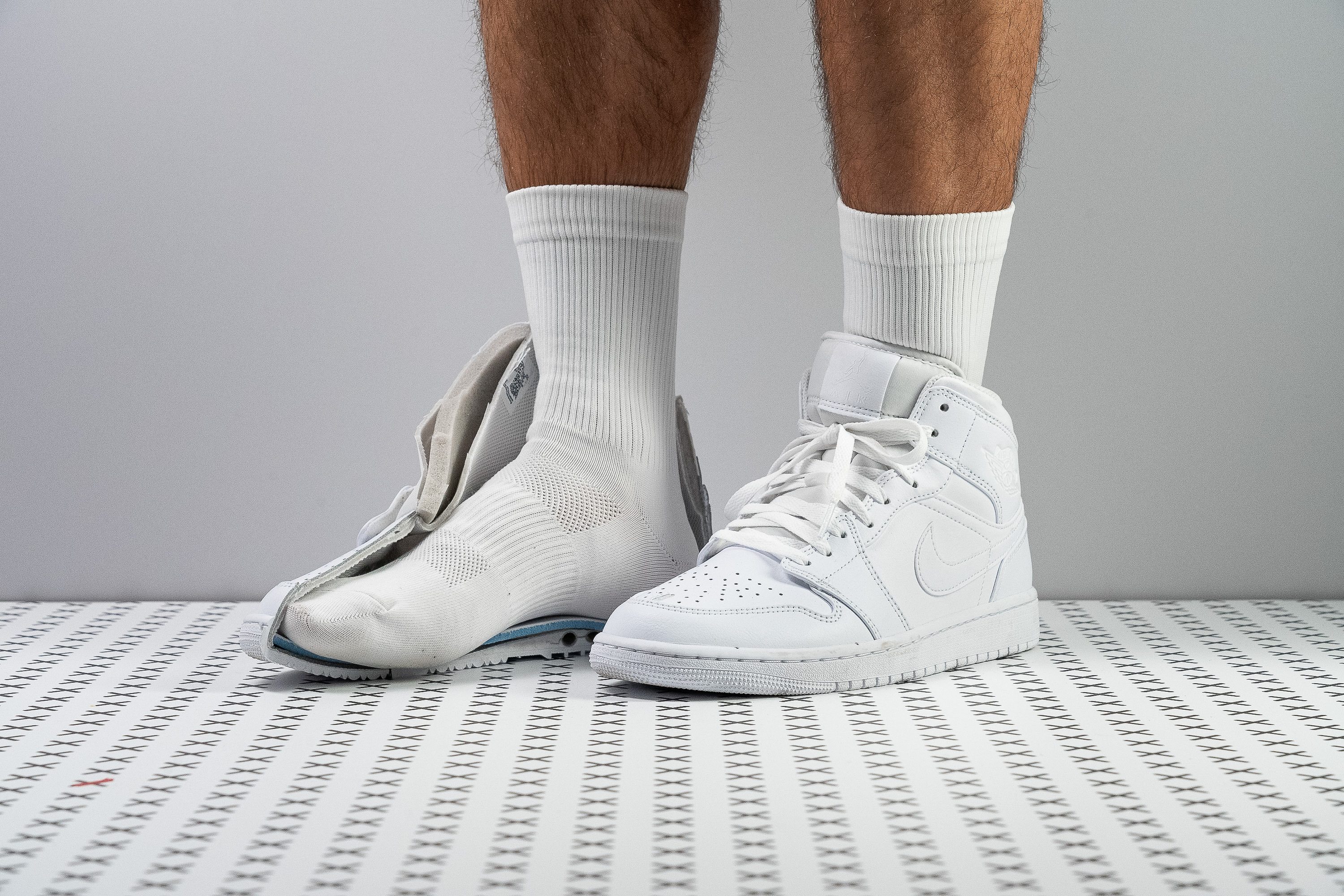Our verdict
Pros
- Iconic and legendary style
- Stable and grounded
- Real leather
- Long-lasting
- Incredibly secure foothold
- A lot of colorways
- Aesthetically versatile
- Budget-friendly
Cons
- VERY heavy
- Creases easily
- Too warm for the summer
Audience verdict
- Top 24% in trainers
- Top 26% in leather trainers
Comparison
The most similar trainers compared
+ + Add a shoe | |||||
|---|---|---|---|---|---|
| Audience score | 93 Great! | 89 Good! | 92 Great! | 86 Decent! | |
| Price | £130 | £100 | £180 | £105 | |
| Style | ClassicRetroSporty | ClassicSportyMinimalist | RetroSporty | RetroSporty | |
| Shock absorption | - | - | Moderate | - | |
| Energy return | - | - | High | - | |
| Traction | - | - | High | - | |
| Breathability | Warm | Warm | Warm | Moderate | |
| Weight lab | 15.1 oz / 427g | 14.7 oz / 418g | 16.3 oz / 462g | 17.4 oz / 493g | |
| Size | True to size | True to size | True to size | Slightly small | |
| Midsole softness | Soft | - | Firm | Soft | |
| Material | Cup SoleLeather | CanvasLeatherSuede | LeatherSuedeTextile | SuedeVulc Sole | |
| Season | Winter | Winter | SpringFall | SpringFall | |
| Inspired from | Basketball | Basketball | Basketball | Skate | |
| Width / fit | Medium | Narrow | Medium | Wide | |
| Toebox width | Medium | Narrow | Medium | Medium | |
| Leather/suede quality | Real leather | Real leather | Real suede | Real suede | |
| Toebox durability | Decent | Good | Good | Good | |
| Heel padding durability | Decent | Bad | Decent | Decent | |
| Outsole durability | Good | Decent | Good | Decent | |
| Heel stack lab | 22.2 mm | 17.5 mm | 25.5 mm | 21.8 mm | |
| Stiffness | Stiff | Moderate | Stiff | Stiff | |
| Tongue padding | Average | Average | Average | Average | |
| Drop lab | 11.0 mm | 6.0 mm | 8.5 mm | 8.1 mm | |
| Forefoot | 11.2 mm | 11.5 mm | 17.0 mm | 13.7 mm | |
| Removable insole | ✓ | ✓ | ✓ | ✓ | |
| Heel tab | None | None | Finger loop | None | |
| Torsional rigidity | Moderate | Flexible | Stiff | Flexible | |
| Heel counter stiffness | Stiff | Flexible | Moderate | Moderate | |
| Closure | Laces | Laces | LacesVelcro | Laces | |
| Top | Mid top | Mid top | Mid top | Mid top | |
| Ranking | #29 Top 24% | #81 Bottom 33% | #36 Top 30% | #110 Bottom 9% | |
| Popularity | #52 Top 43% | #50 Top 42% | #27 Top 23% | #51 Top 43% |
Who should buy
If you're an AJ fan, you're gonna love it; and if you're not, then you'll definitely fall in love with it if you're looking for:
- A padded and well-built leather icon to walk around town.
- A stylish pal that will stay by your side for many winters.
- A stable and secure model that will catch people's eye.
- A functional fashion statement that never goes wrong.
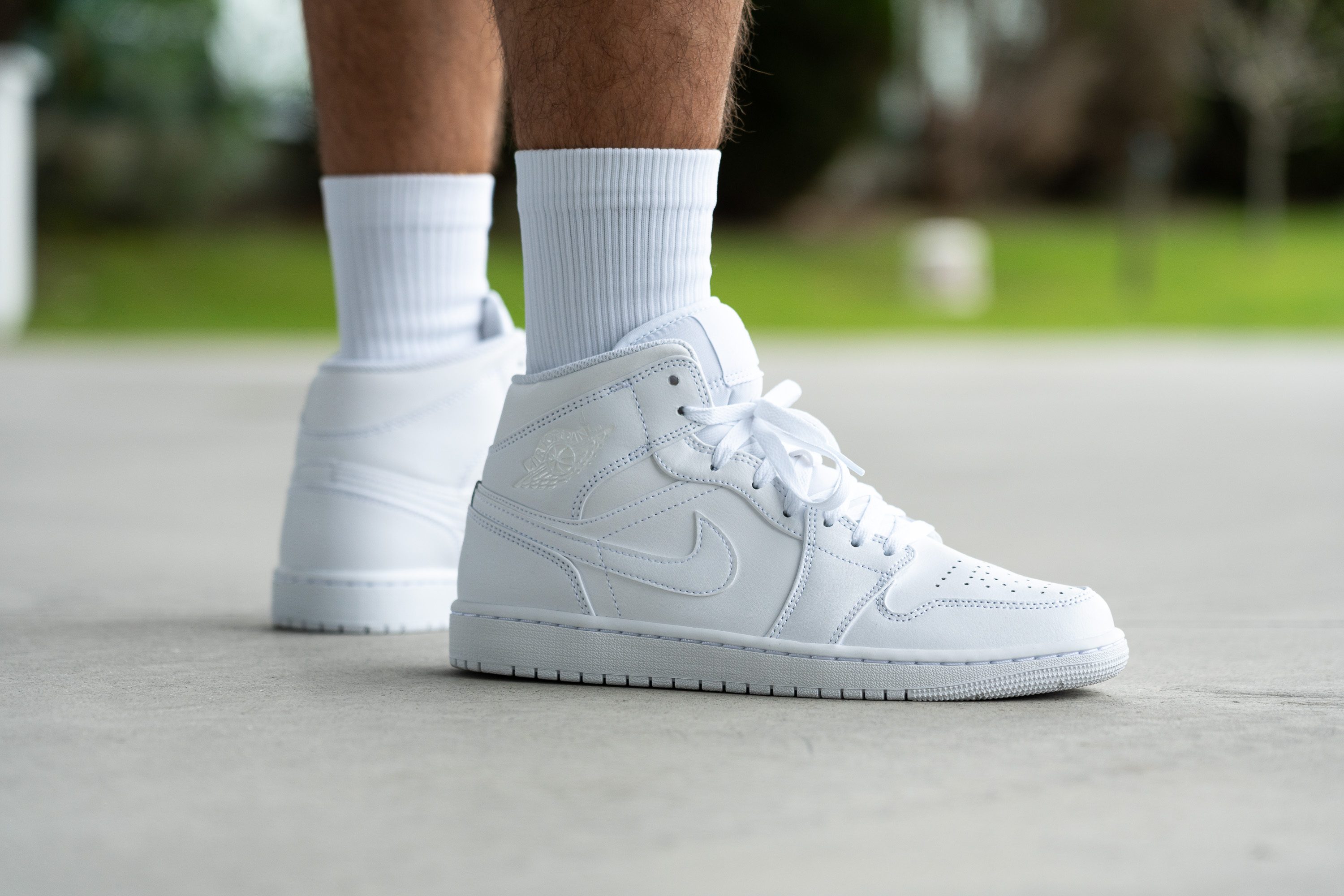
Who should not buy
Even though it used to be a basketball shoe, which is a sport full of big players (literally and figuratively), the AJ 1 Mid is not the best for wide feet users. If you don't mind going for a low-top model, we totally recommend the Nike Dunk Low, which has a very similar style. Nevertheless, if you're all down for mid-tops, as long as you don't mind changing the hoop for the skate, then you could try the Vans Half Cab.
There are two more reasons why you and these kicks might not be the best duo in town. If you're looking for something to wear in the summer, forget about this Air Jordan and try the legendary Nike Air Force 1 07 or the Nike Air Max 90, which is also quite popular, just slightly pricier. If you're even more ambitious (yep, we love that) and something that lets your feet breathe is not enough, as you also want it to be lightweight, we've got a winner: the Nike Air Max 270.
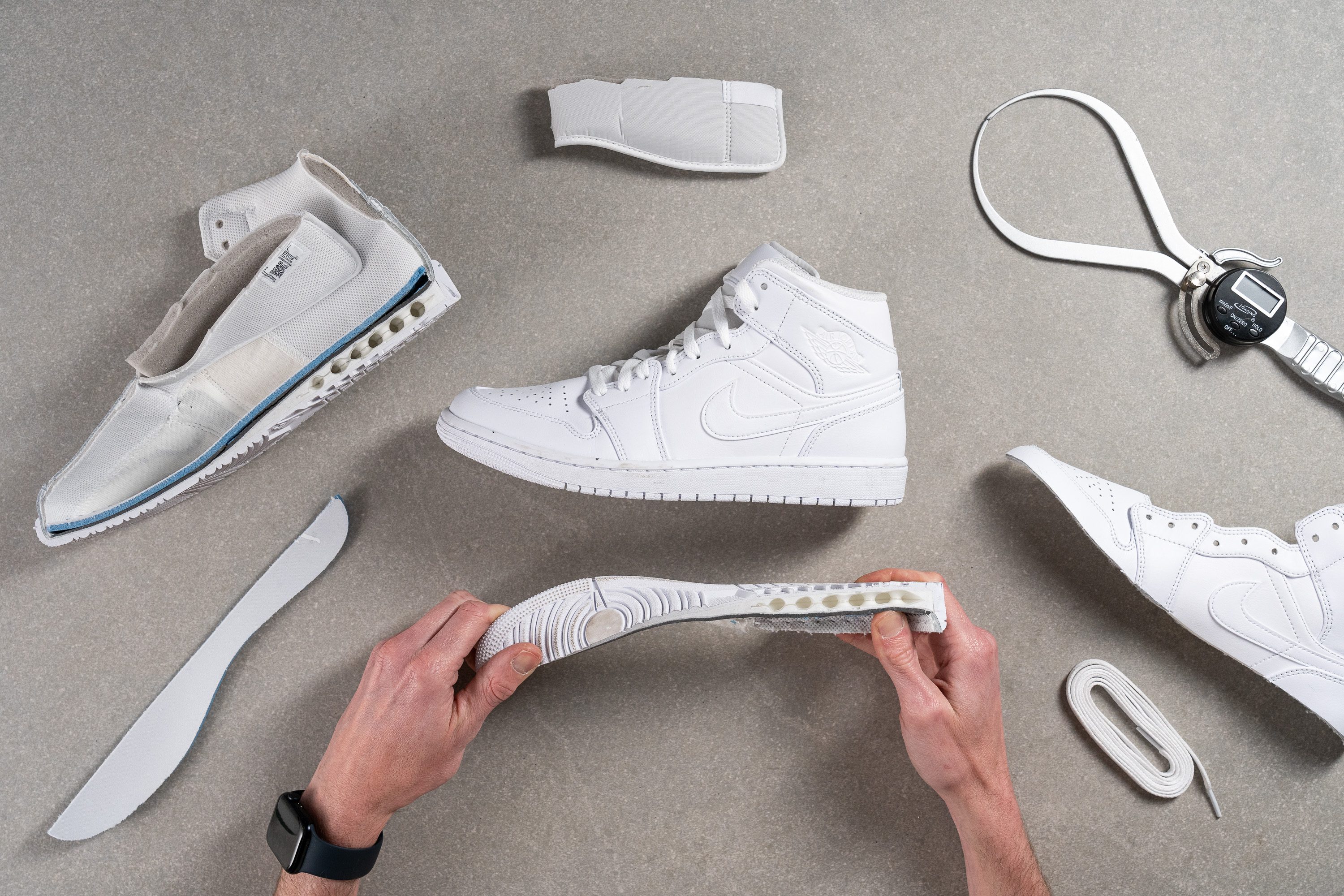
Cushioning
Heel stack
These kicks might look big but their heel stack sure isn't!
At 22.2 mm according to our calliper, it's a whole 34% lower than average. This means you'll feel closer to the ground. But worry not, this pair's thick outsole is there to protect your feet!
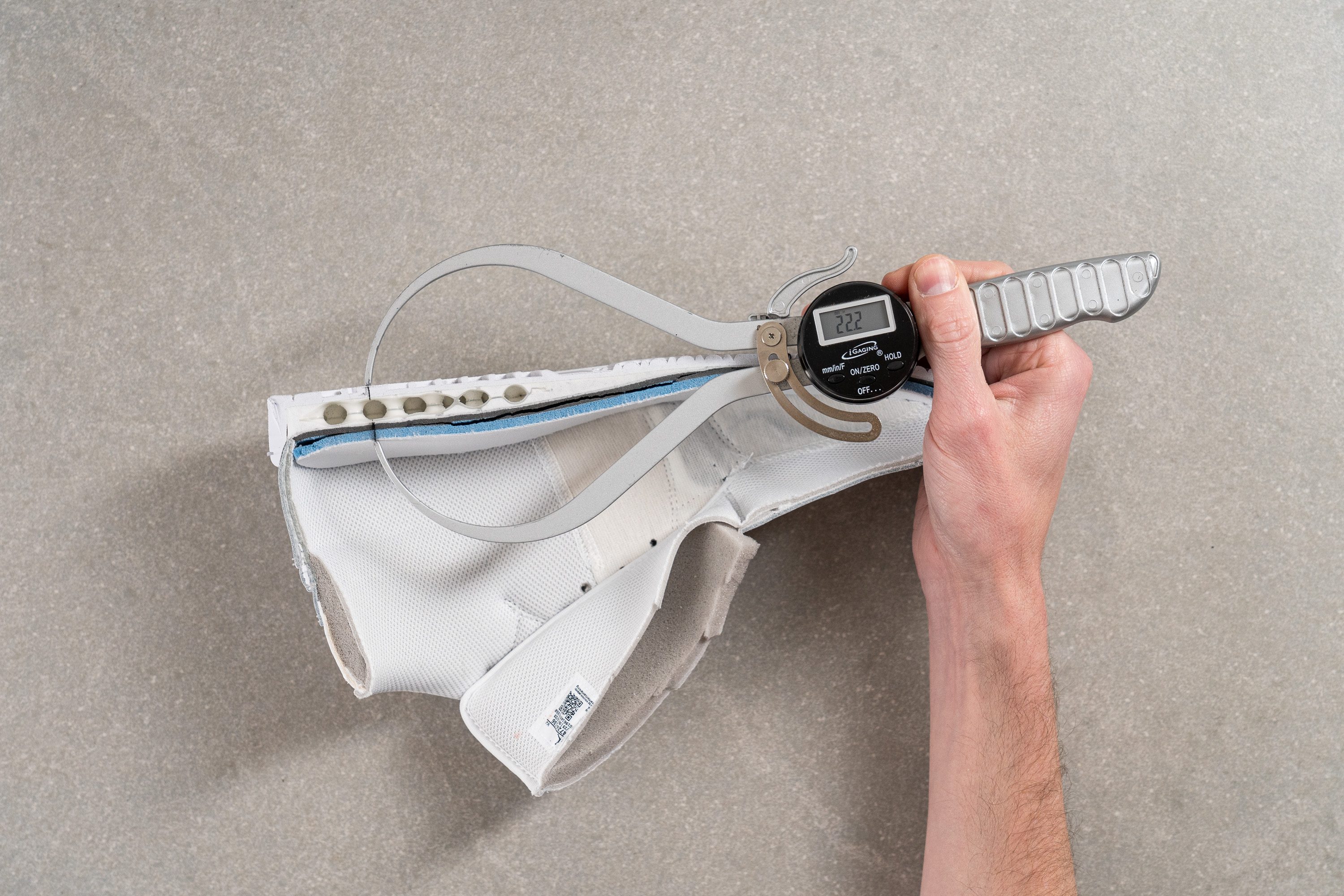
A lower stack equals better ground feedback, and it also helps you to be in control of every move regarding your feet, enhancing their precision and accuracy. These 2 key points can be seen in many basketball shoes, which once again goes back to this model's history.
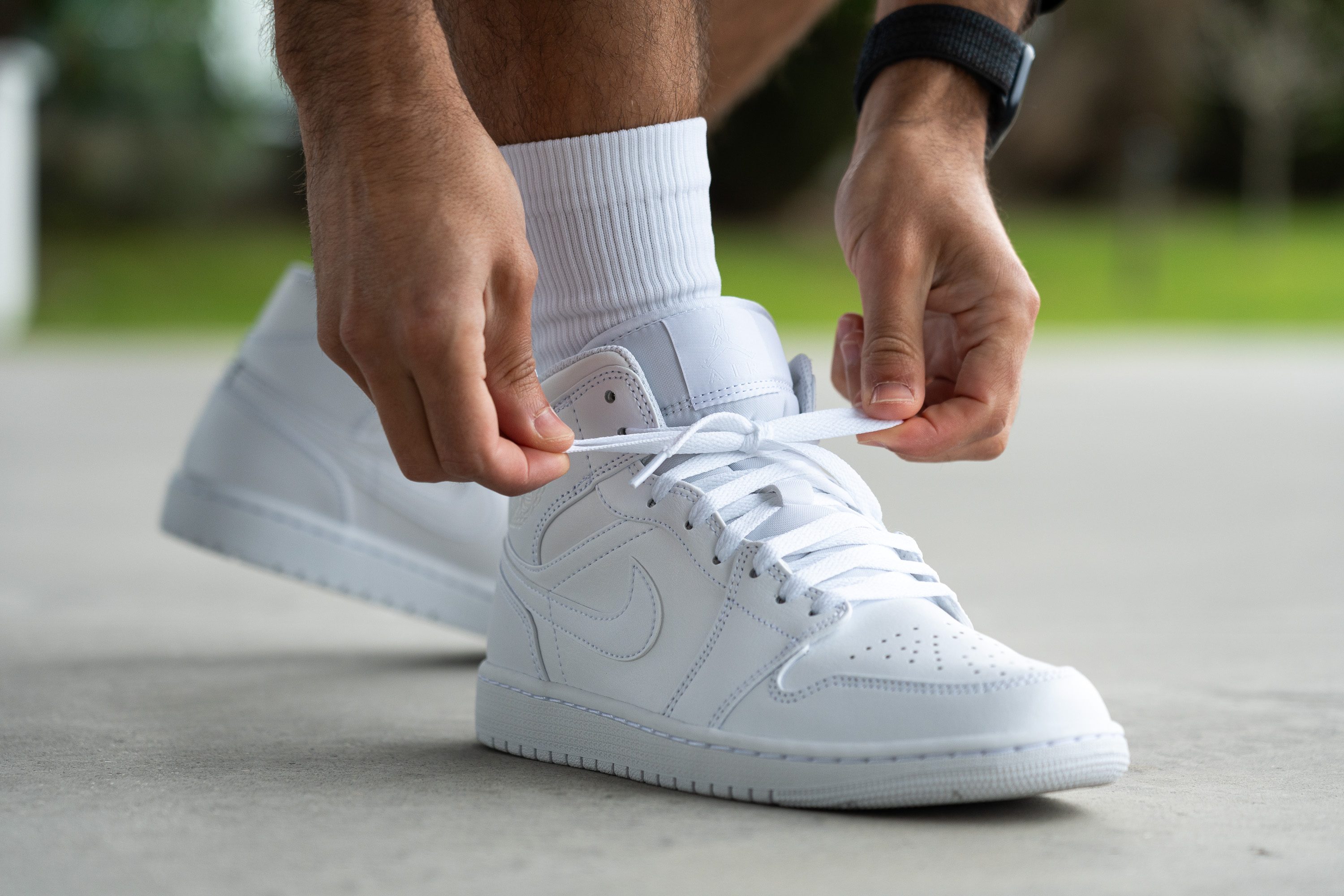
| Air 1 Mid | 22.2 mm |
| Average | 30.7 mm |
Forefoot stack
The forefoot stack is even lower! At 11.2 mm, your toes will definitely feel whatever is underneath.
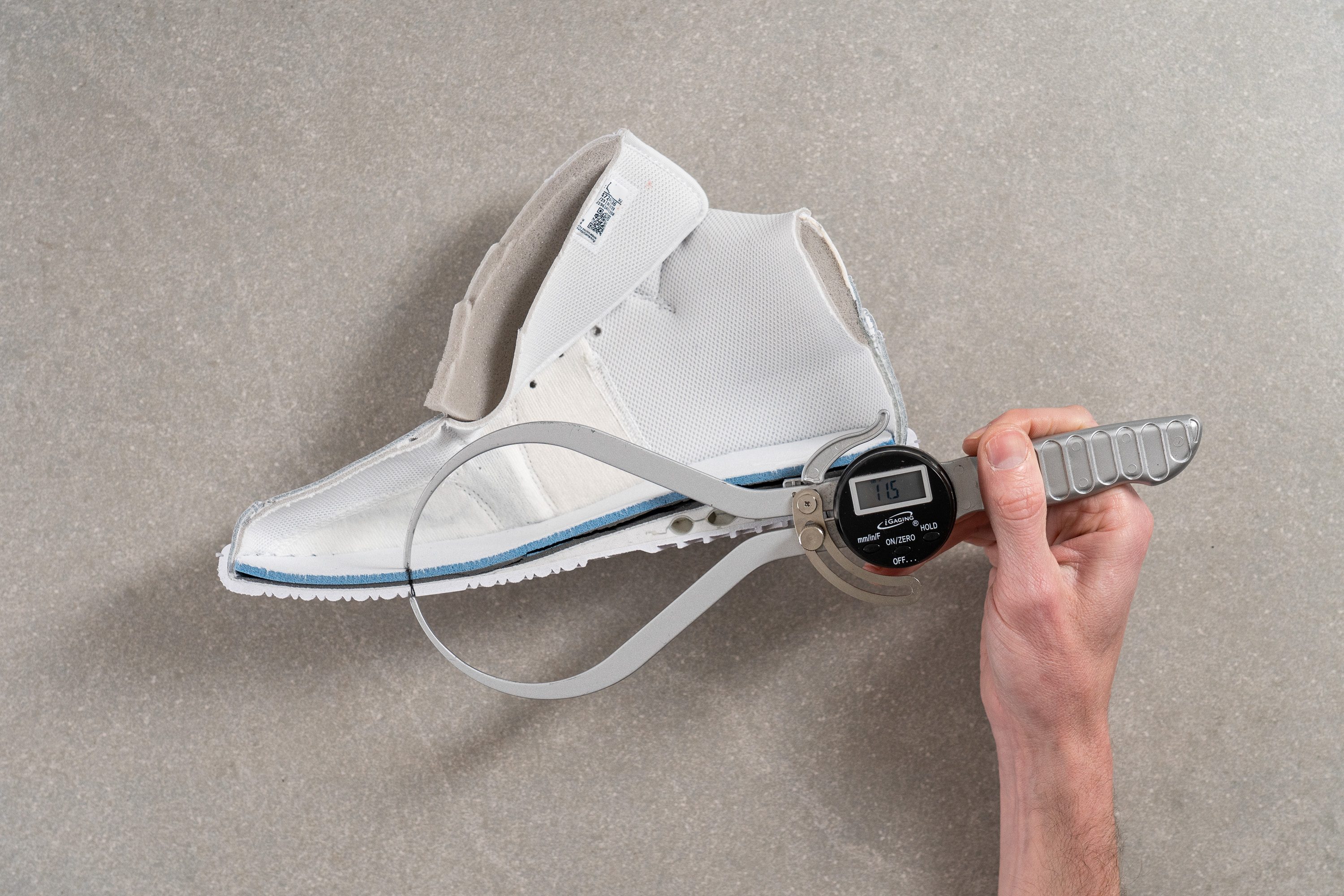
After explaining this shoe's heritage (apart from some weight reduction) as the reason why it's sole is quite thin, there's still one more issue we'd like to address before we move on.
When we see a shoe with a high stack, we tend to think: "Alright, that's gonna be plush", and if the stack is low, our mind goes to: "Uh-oh, might as well go barefoot". Yet, this is not always the case. Let's explain it with a couple of examples:
The model we're currently analysing, the Air Jordan 1 Mid: low stack (heel: 22.2 mm; forefoot: 11.2 mm). This is what it's like when you put it on.
The New Balance 237, a shoe we've used before throughout this review in a comparison: high stack (heel: 35.2 mm; forefoot: 25.2 mm). This is how it feels on foot:
You can probably tell from the images, right? Even though the NB pair has a 10 mm stack height difference, it's NOT softer! So, all in all, higher doesn't mean plush.
| Air 1 Mid | 11.2 mm |
| Average | 19.5 mm |
Drop
At 11.0 mm, this shoe's drop is average. The drop is the difference between the heights of the heel and the toes, and there's no such thing as "a good drop" or "a bad drop". It depends on your personal preferences.
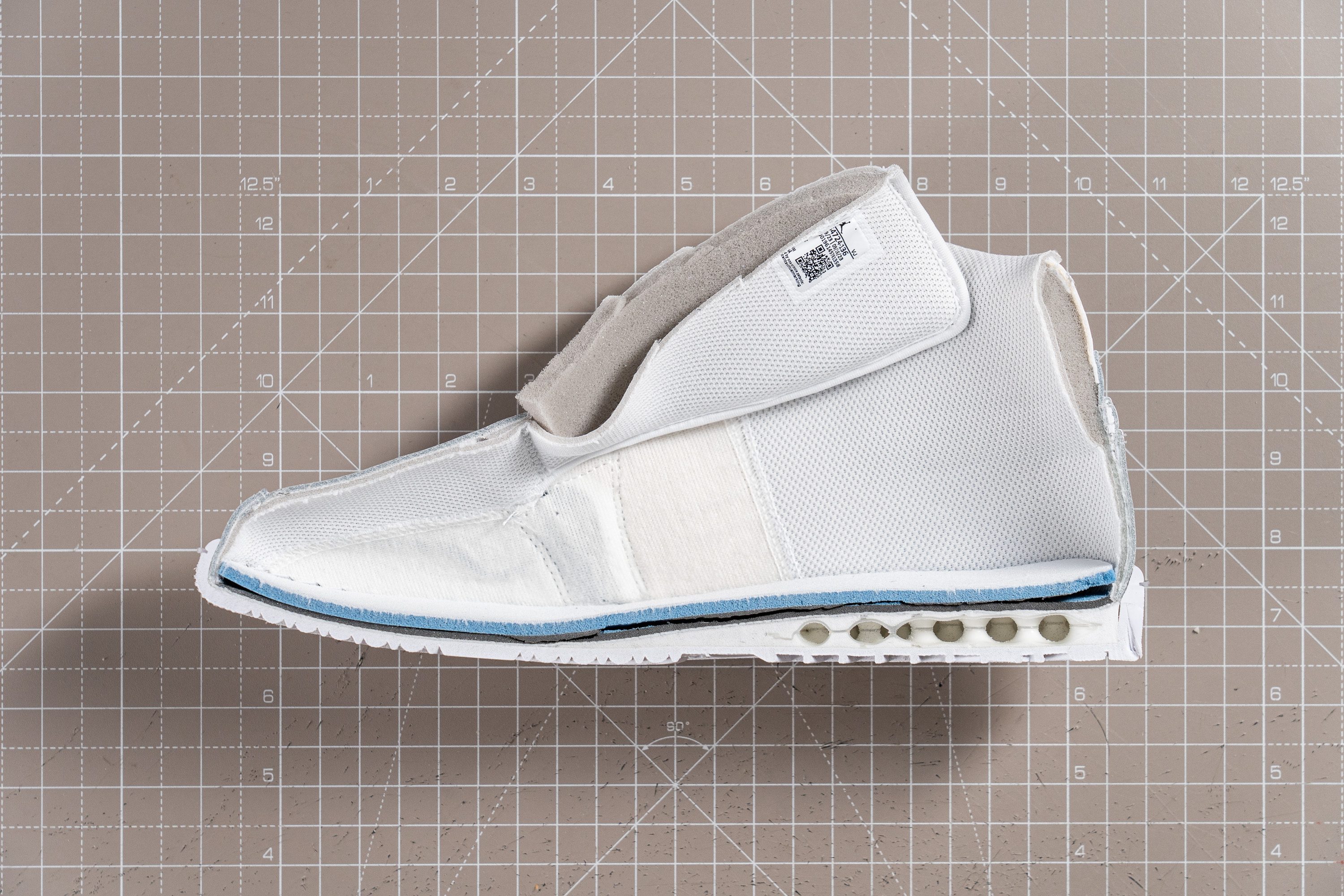
Following our experience during our wear tests, we found this shoe to feel incredibly natural on foot. It was more comfortable than we expected, honestly! That's why it's so important to conduct lab tests and wear tests. In other words, this AJ 1's sole might seem uncomfortable or too thin in the pictures, but our feet completely disagreed!
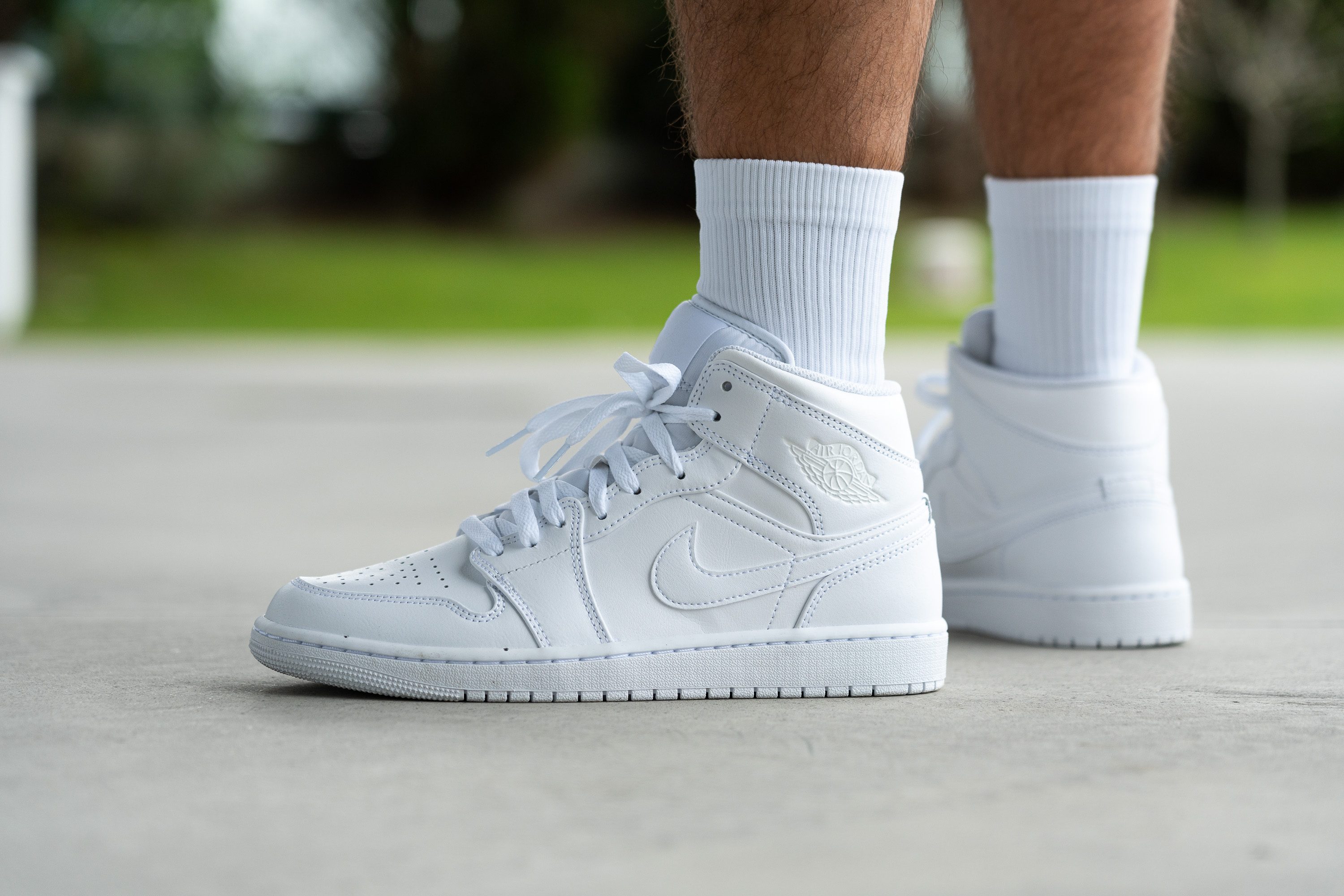
Still, we can't say it's the most comfortable shoe out there. These Nikes are made to brag, but not to walk all day long! If you're looking for a new walking pal, make sure you check our walking shoes.
| Air 1 Mid | 11.0 mm |
| Average | 11.2 mm |
Midsole softness
It's time to explain all the mess about this shoe being comfortable, but with a thin sole, but also with an Air Unit, but also with an outsole with an average hardness... and so on. Ladies and gentlemen, get ready to welcome the main character of this story: the midsole!
More specifically, in this section we measure the midsole softness. In order to do so, we grab our durometer and press it against the midsole once the shoe is cut in half.
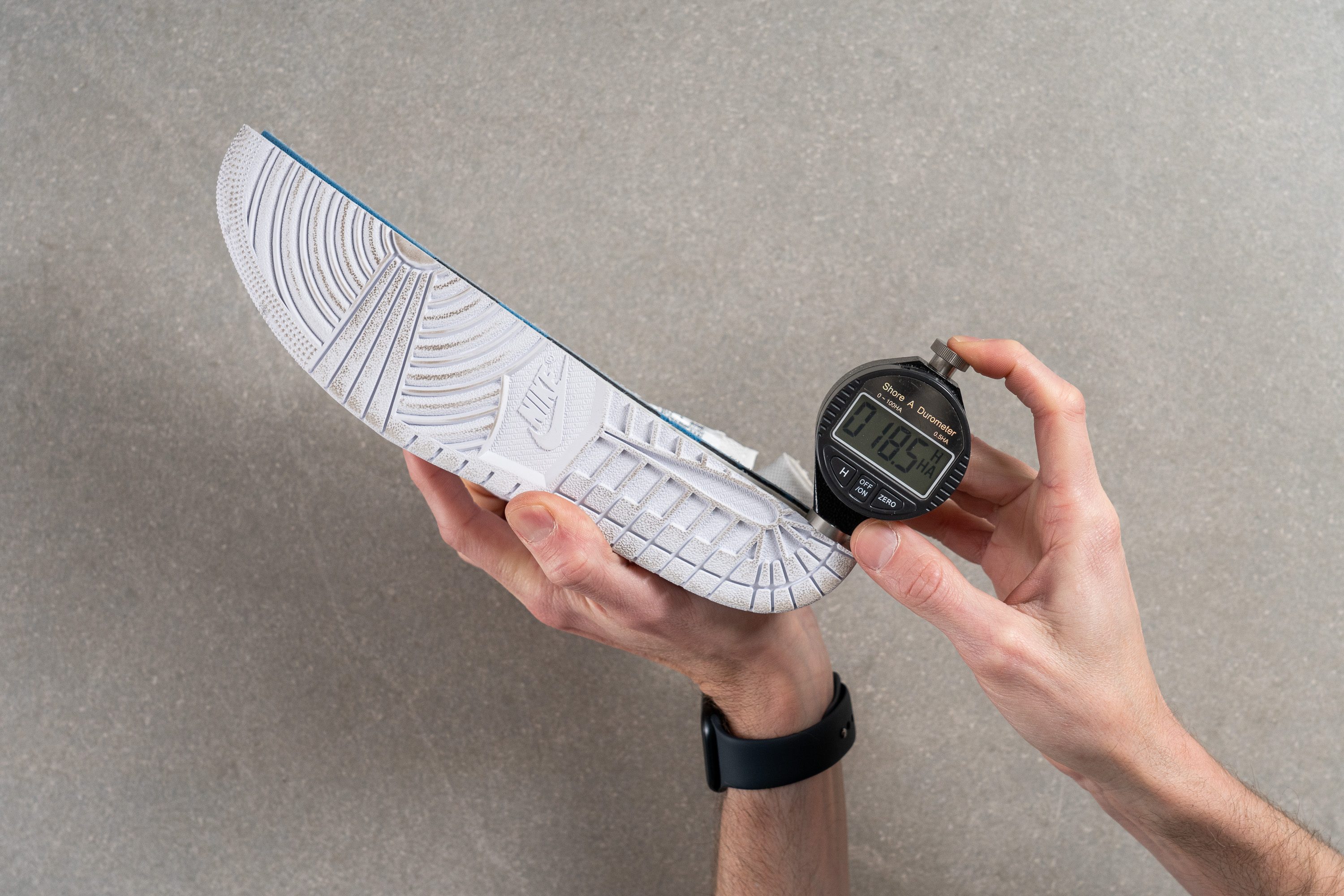
At 18.5 HA, our feet were definitely right when they said this pair was comfy! This result is a whopping 54% softer than average, so bye-bye brick-like accusations!
We loved bragging about these cuties in our daily strolls. And trust us, they do catch people's eye! After all, its iconic and legendary style is hard to ignore.
| Air 1 Mid | 18.5 HA |
| Average | 28.6 HA |
Size and fit
Size
Air Jordan 1 Mid fits true to size (2327 votes).
Internal length
| Air 1 Mid | 271.2 mm |
| Average | 272.3 mm |
Width / Fit
Just like its low-top version, the Air Jordan 1 Mid offers a solid D medium fit which is just perfect for a medium-width foot.
The shoe's gel mould showed that its interiors are as wide as 94.9 mm in the area between the big toe and the pinkie. Air Jordan 1 Mid is more spacious than the average sneaker we tested but not enough to call it wide.
| Air 1 Mid | 94.9 mm |
| Average | 92.5 mm |
Toebox width
Measuring the width of the toebox, our calliper returned another above-average reading of 70.4 mm.
But why does the Jordan 1 Mid seem kind of pointy? That's because the shoe is wide in the metatarsal area in the first place.
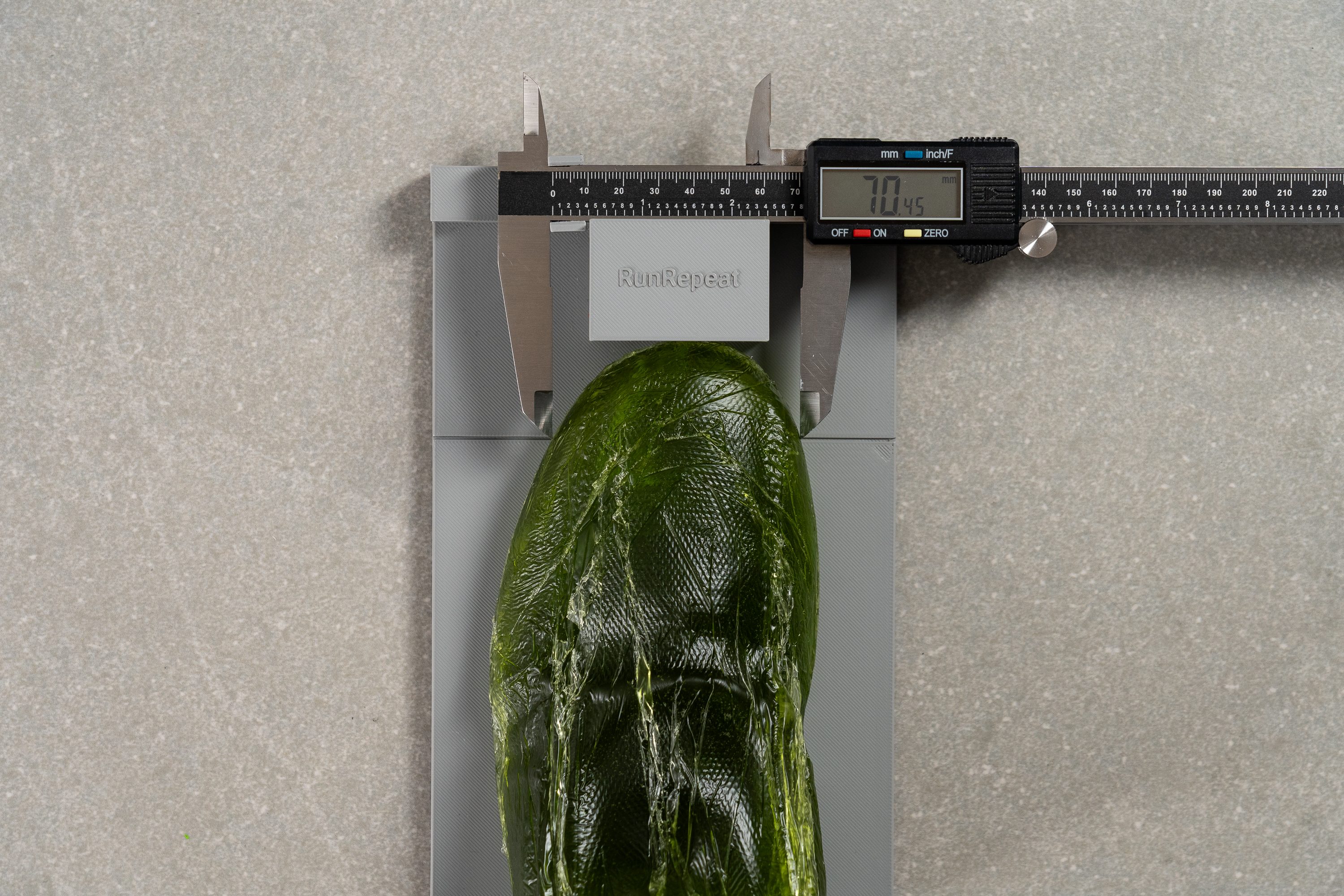
| Air 1 Mid | 70.4 mm |
| Average | 68.9 mm |
Toebox height
The toebox height of this Air Jordan shoe also proved to be on par with the average. There should be no toe pressing from the top as the shoe's vertical space comes in at a standard 25.7 mm.
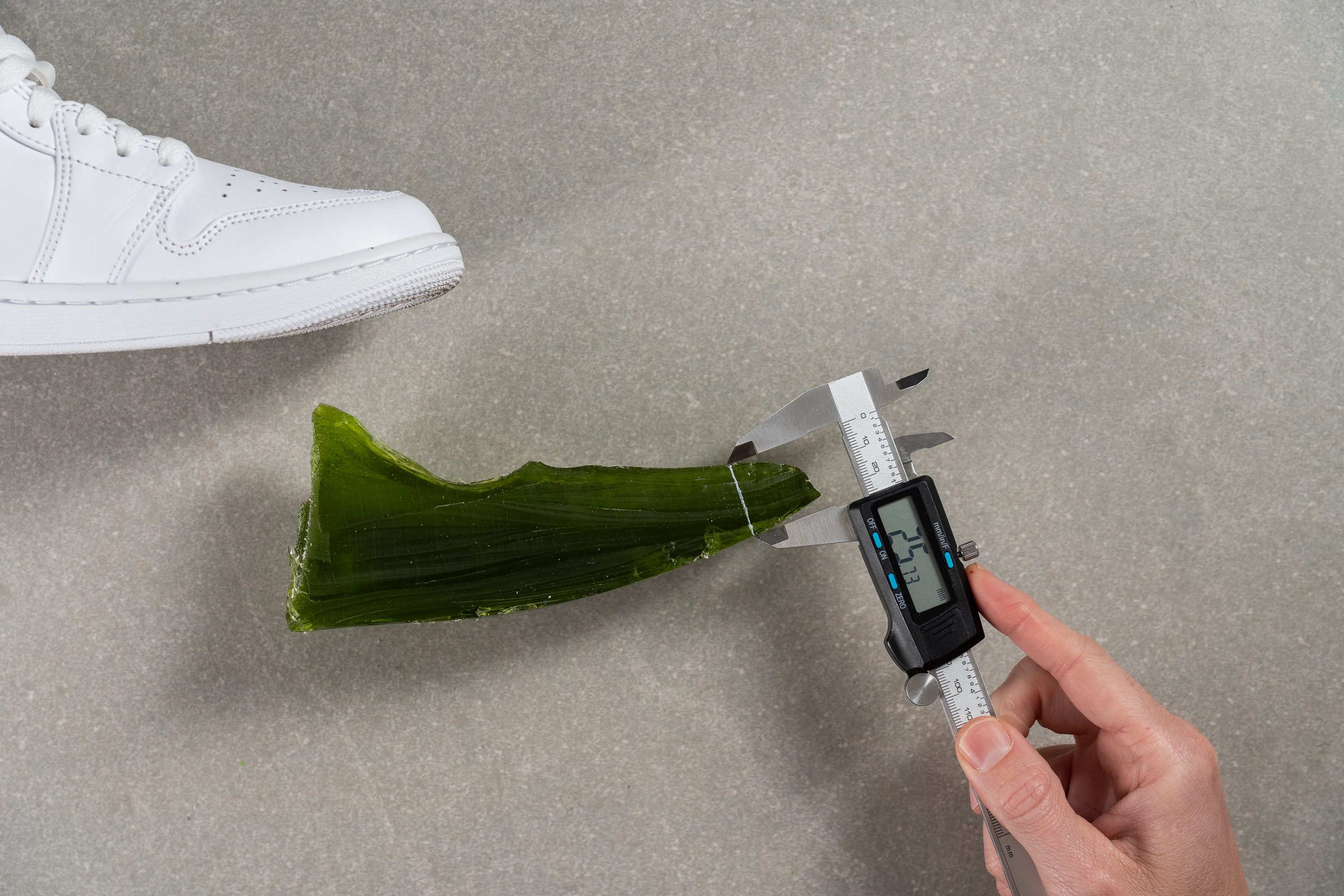
| Air 1 Mid | 25.7 mm |
| Average | 27.8 mm |
Flexibility / Stiffness
If we follow the results of our previous lab tests, where we saw this shoe's high torsional rigidity and durable materials, we would say it can't be very flexible. But if we just think about how our feet felt in our wear tests, then we would bet it all on this AJ being flexible.
But wait... what?! That was so easy!! At 17.2N, it's 34% more flexible than average. Honestly, this shoe's design might just be spot on. It felt comfortable and nice when we were walking around as it easily bent with our strides. At the same time, our feet felt safe inside, as the padding embraced them in a warm and comfortable hug.
So not only are these kicks pretty, they're also comfortable from the outsole to the heel collar! The softness of the midsole and the overall flexibility of the shoe make it hard to believe it's actually torsionally rigid and well-structured. Like... look at this, isn't this pure fantasy?
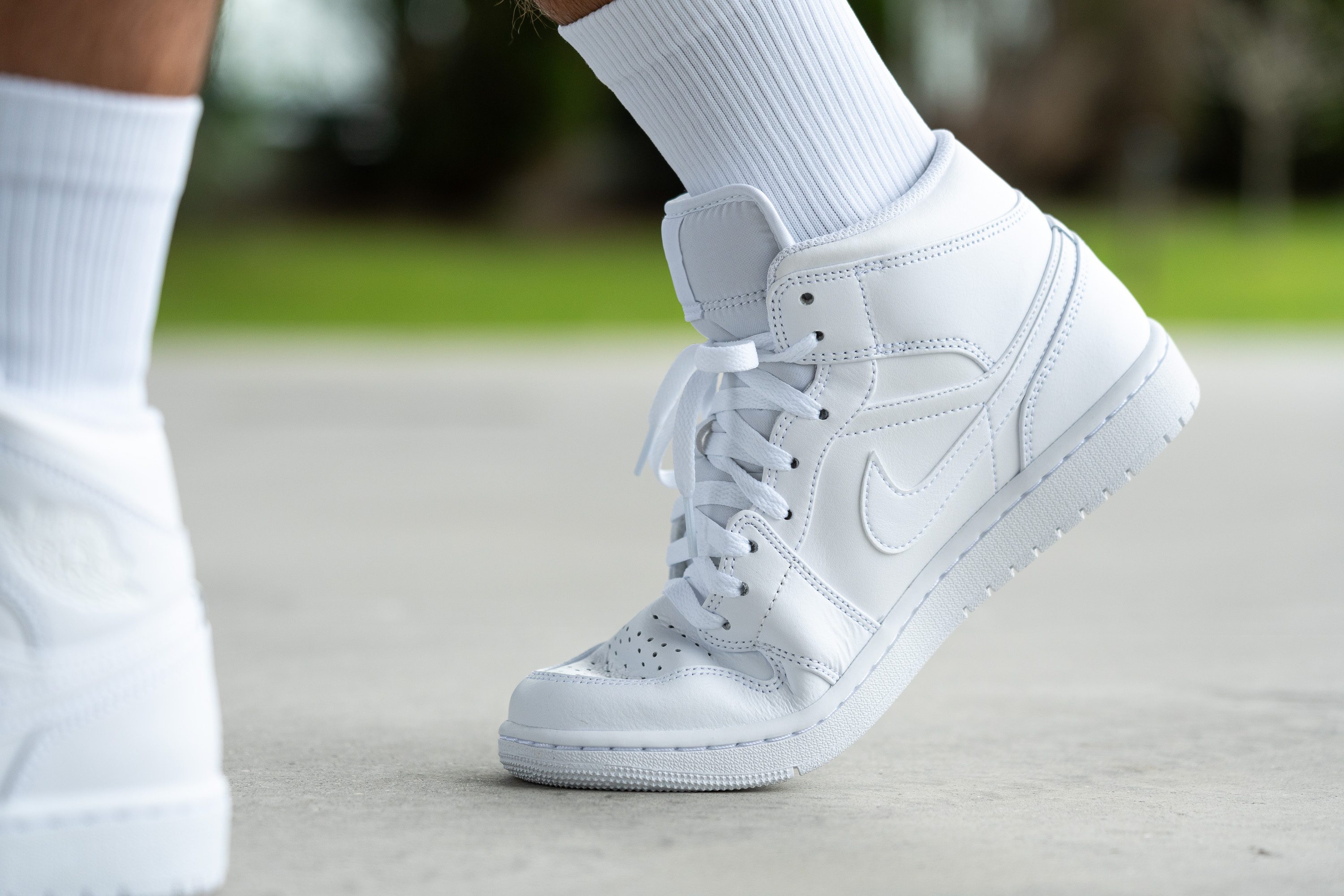
This test follows an older methodology, which is why you don't see recently tested shoes in the chart. Results from different methodologies can not be compared.
| Air 1 Mid | 17.2N |
| Average | 23.3N |
Weight
We're gonna get straight to the point: these baddies are HEAVY.
At 15.1 oz (427.0g), this shoe is 1 oz heavier than average, which is... a lot, trust us.
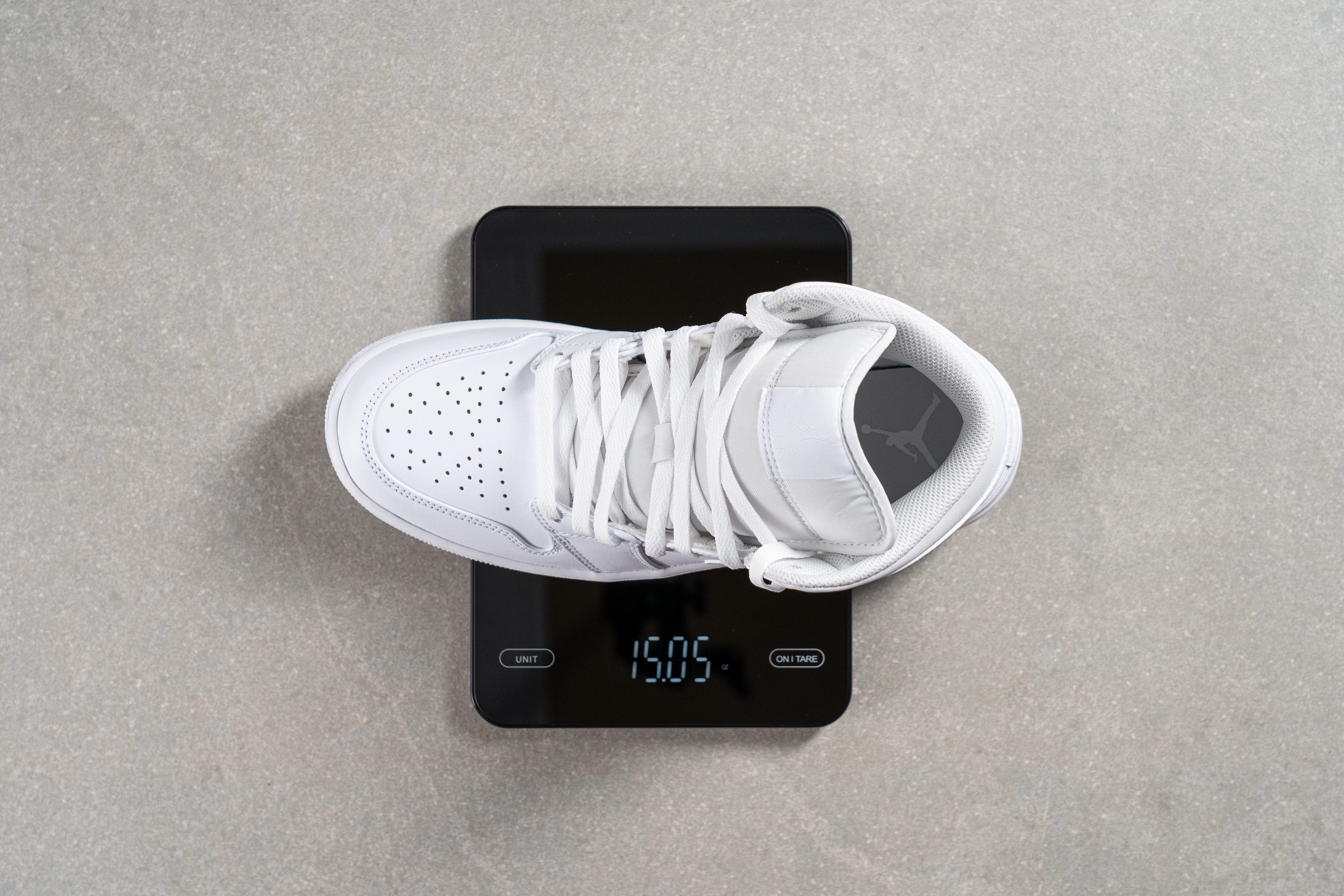
Even though its outsole is thin, its materials are thick and resistant. Also, it's a pretty padded model, just check this out:
You can clearly see there that this shoe focuses on padding and comfort. Its upper is thick, durable, and warm, making it perfect for your winter activities around town. Nevertheless, this is what gives it the extra weight.
But we want to mention that we didn't really feel this was a problem in our wear tests. We enjoyed walking in the streets of our city with these stylish pals. And even though they're not a couple of feathers, it didn't feel like we were walking with ankle weights.
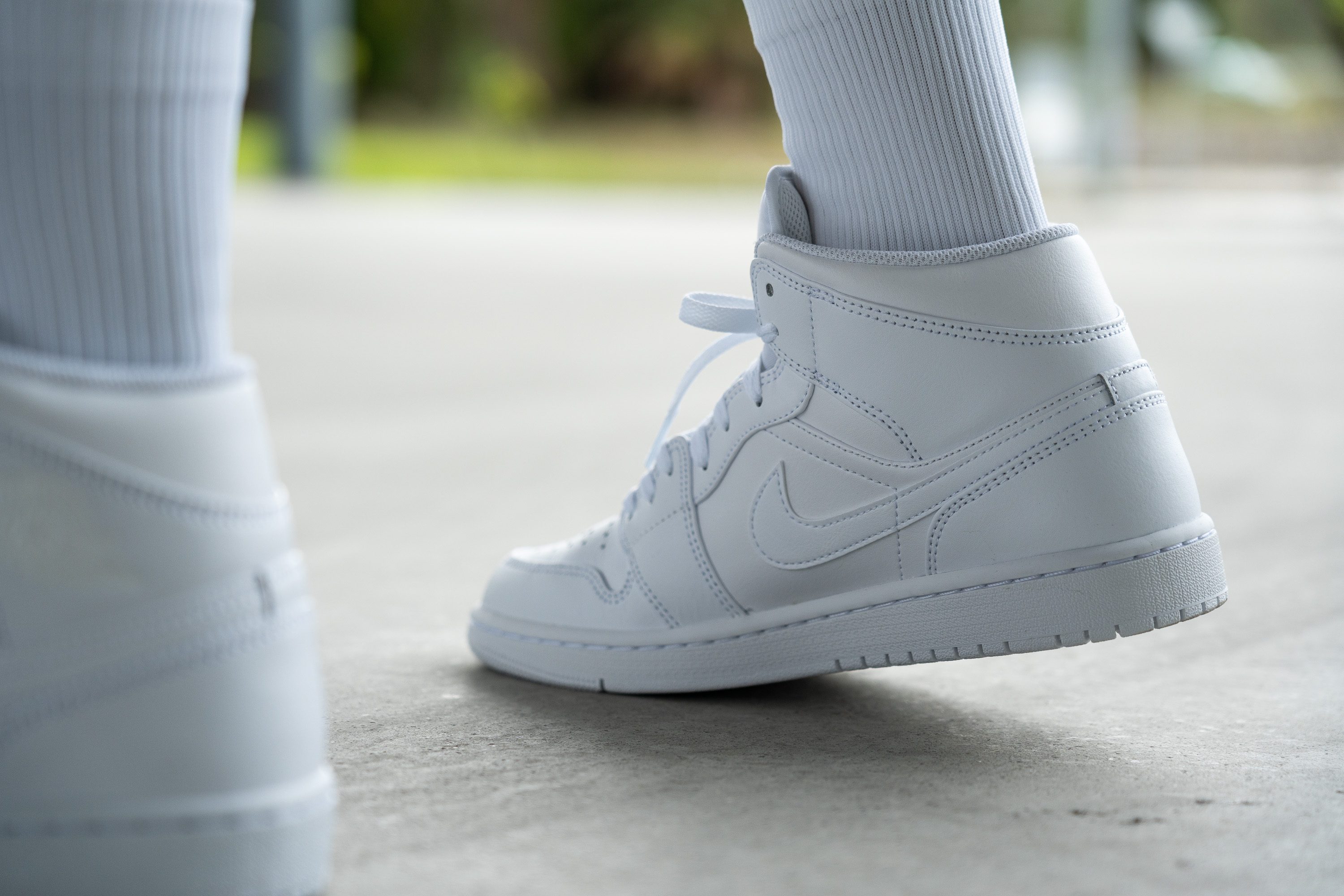
There's a key point you need to know to understand this AJ better: its basketball heritage. Like many hoopers, this shoe would prioritise durability and resistance, which made it stay on the heavier side. Additionally, it's a mid-top shoe! These trainers are bound to be heavier than the low-top ones, and they use more material.
You can check our basketball-inspired trainers collection right here.
| Air 1 Mid | 15.1 oz (427g) |
| Average | 13.8 oz (390g) |
Breathability
The Air Jordan 1 Mid becomes the Smoke Jordan 1 Mid for some minutes in our breathability test. To check the ventilation of the trainers that come to our lab, we use a small device to fill their interior with smoke. Then we see how much of it actually goes through the upper, paying some extra attention to which parts let it out.
Uh-oh. So this Air Jordan isn't especially airy, is it? Just look at the comparison with the New Balance 57/40. The AJ lets only a little bit of smoke out, and it all comes from the tongue (spoiler: it's a non-gusseted one, so the air manages to sneak out). Still, this is pretty much nothing compared to how wonderfully the New Balance pair breathes. The smoke dances around the whole shoe, making it wonderful for your summer adventures.
The AJ 1? Well... just keep them in your wardrobe until the weather gets cold!
Our light test agreed as you can see. The light can't go through the shoe's material at all, which means no hidden ventilation holes! But wait..., our microscope has something to say!
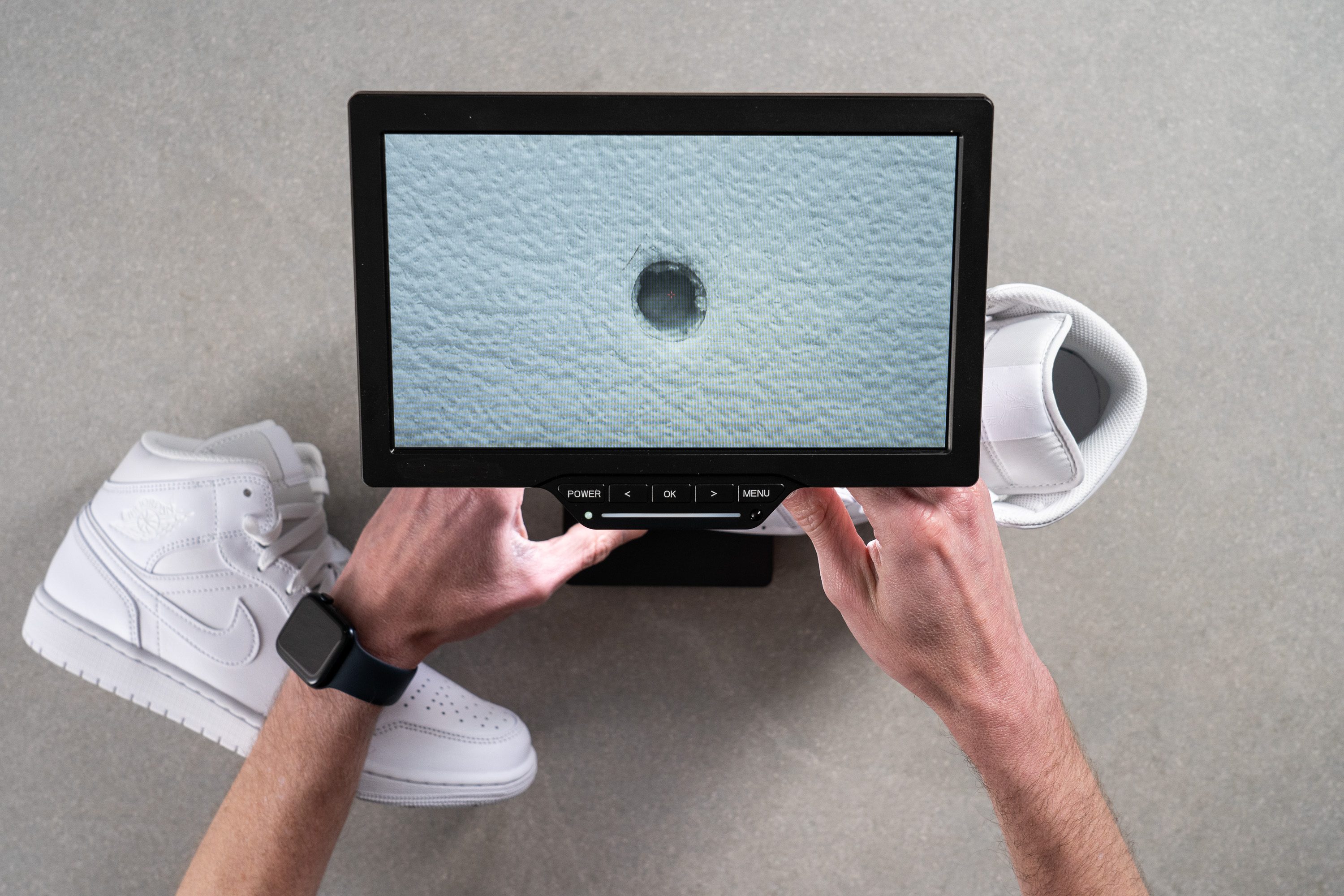
Now, now, that IS a hole, right? The forefoot is actually full of them! So how come the smoke couldn't get through them? Let's take a closer look.
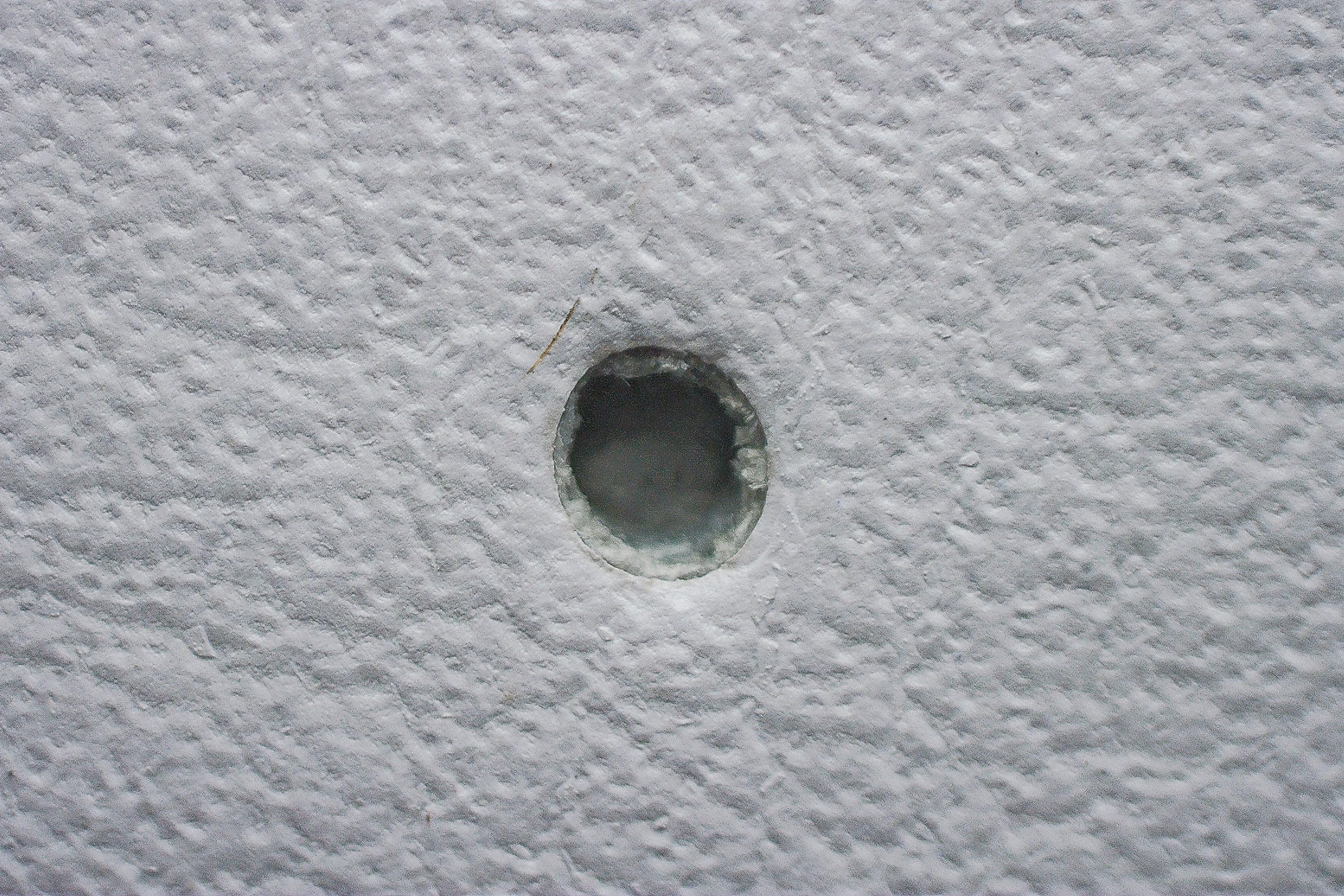
Oh... sneaky, sneaky Air Jordan 1, that hole is not actually a hole! There's a layer of material that we can clearly see inside. So these round details are more of a decorative touch, not a functional one. A 1/5 in breathability is what you get. So sorry, you couldn't possibly fool us!
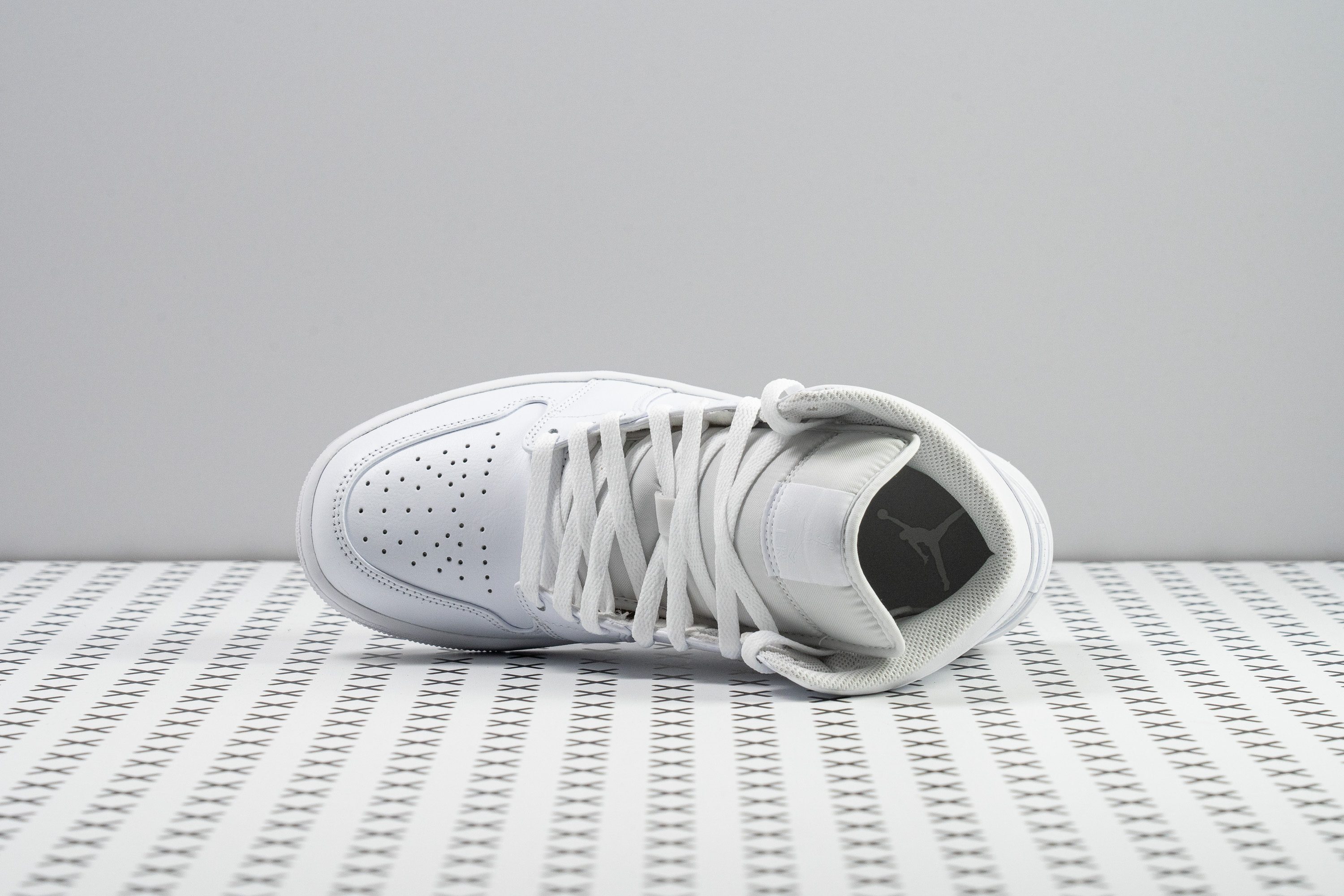
Once again, this is why we believe that performing multiple tests in every shoe is crucial. At first glance, it's easy to think that the round details in the toebox would let the air go through. But here in RunRepeat we dig in and in until we find out as much as we can about every model!
If you're looking for a new summer pal but you're all about iconic style, as long as you don't mind changing brands, we suggest the Adidas Campus 00S. It's also a leather and basketball-inspired shoe, give it a shot!
| Air 1 Mid | 1 |
| Average | 3 |
Stability
Lateral stability test
The mid-top and rigid structure of this shoe help to keep your feet in place.
As you can see in the video, your ankles are safe with the AJ 1 Mid. Just one more thing that will make you fall in love with it!
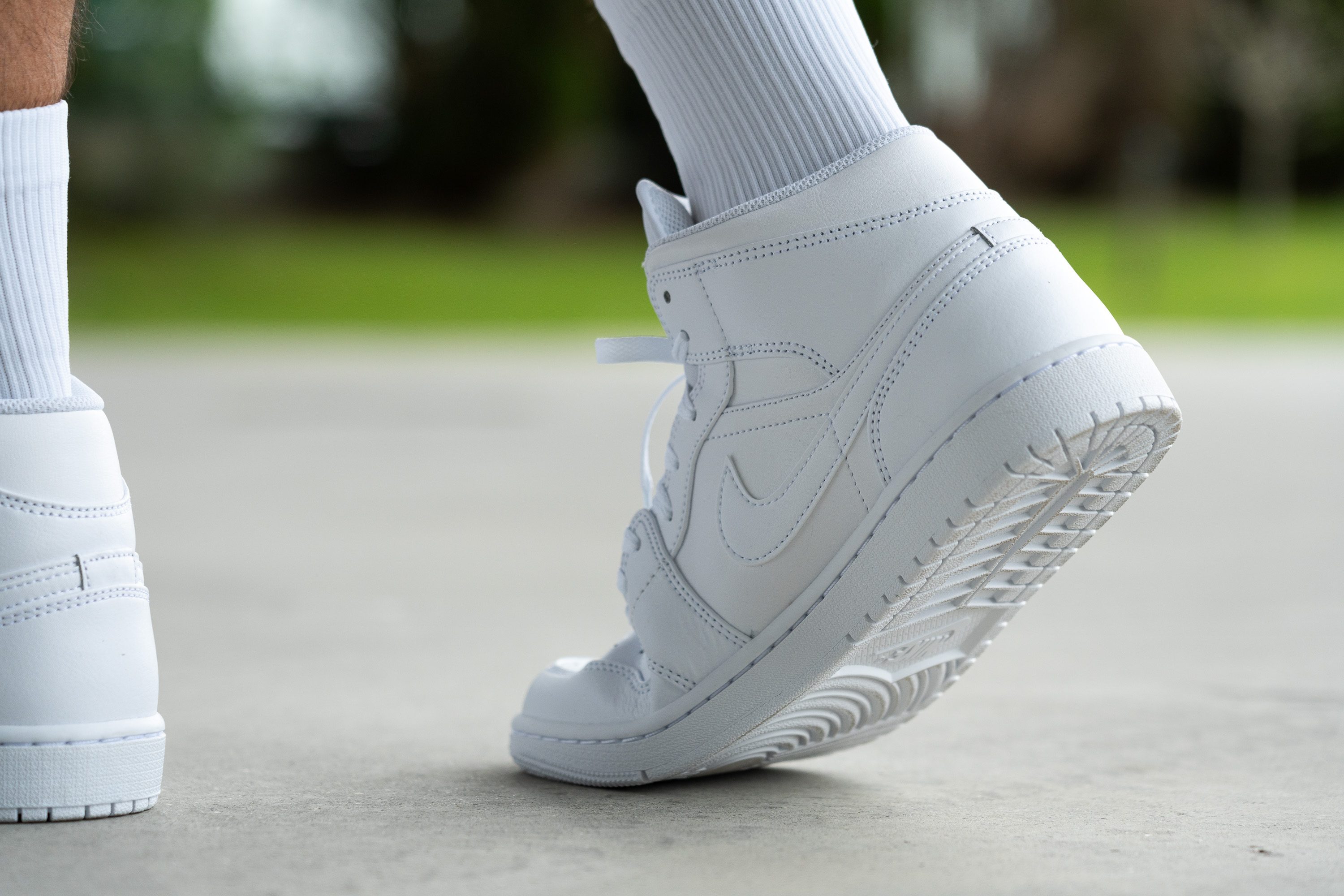
There's no heel slippage, as the collar of this model is comfortably padded. A wonderful combination, really! Happy feet, happy us!
Torsional rigidity
We would be lying if we said we didn't see this coming: the AJ 1 Mid is a rigid pair.
Bending it is no easy task, so it earned a well-deserved 4/5 in our torsional rigidity test. Almost the highest score! Sometimes, this has a negative effect on the ride, as it doesn't let the shoe bend as much with the movements of your feet. Yet, we need to disagree on this common thought once again.
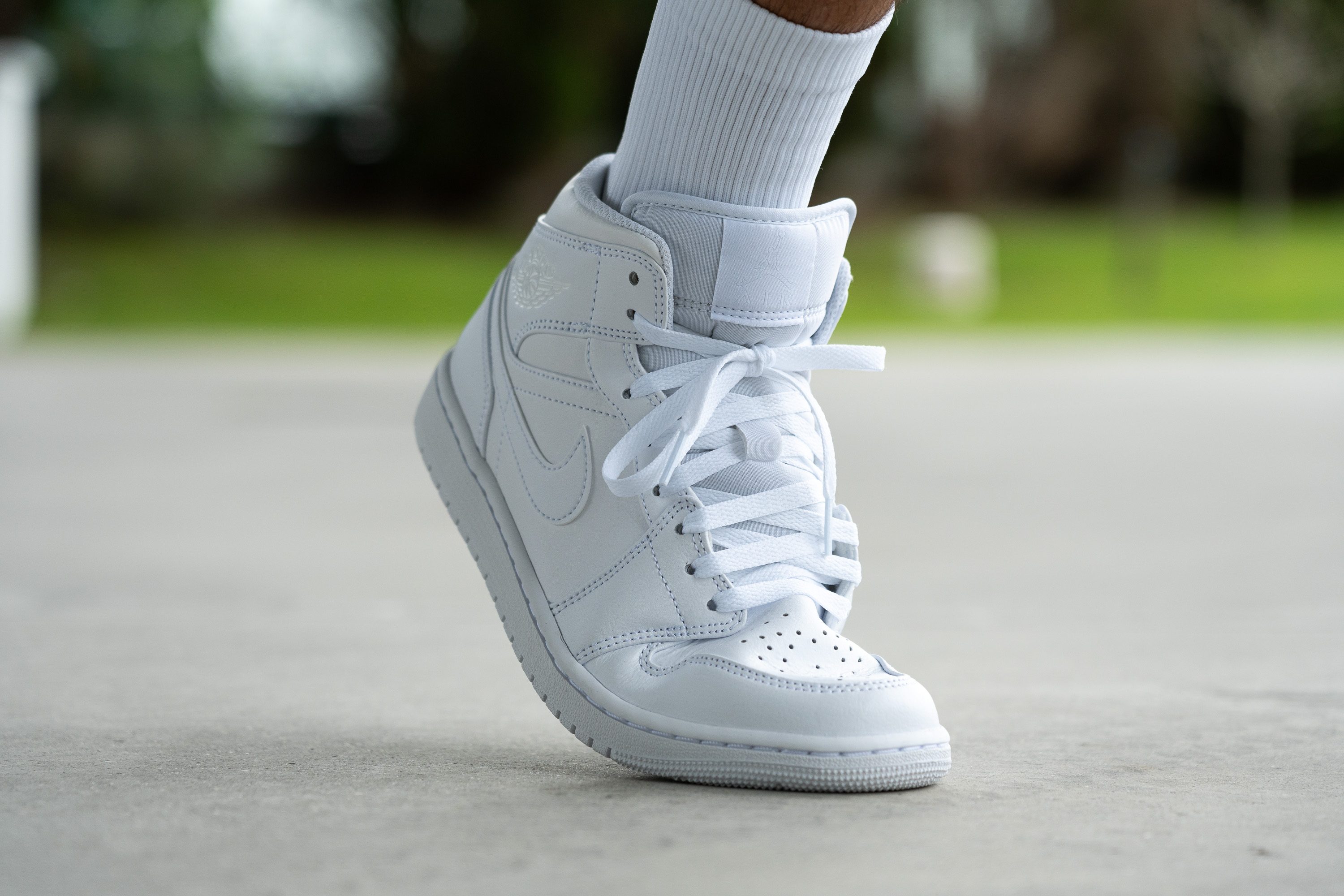
When we put on these baddies and run some errands, we found them comfortable enough. It was not hard for us to bend them with our feet, and the walking experience was pretty nice overall!
| Air 1 Mid | 4 |
| Average | 3.6 |
Heel counter stiffness
The heel also makes sure your feet and ankle are well supported, scoring a 4/5 in our stiffness test.
As you can see in the video, the heel counter does not give in easy. This might have meant that you could get hotspots the very first times you put this shoe on, but the abundant padding of the area makes sure you stay comfy from top to bottom.
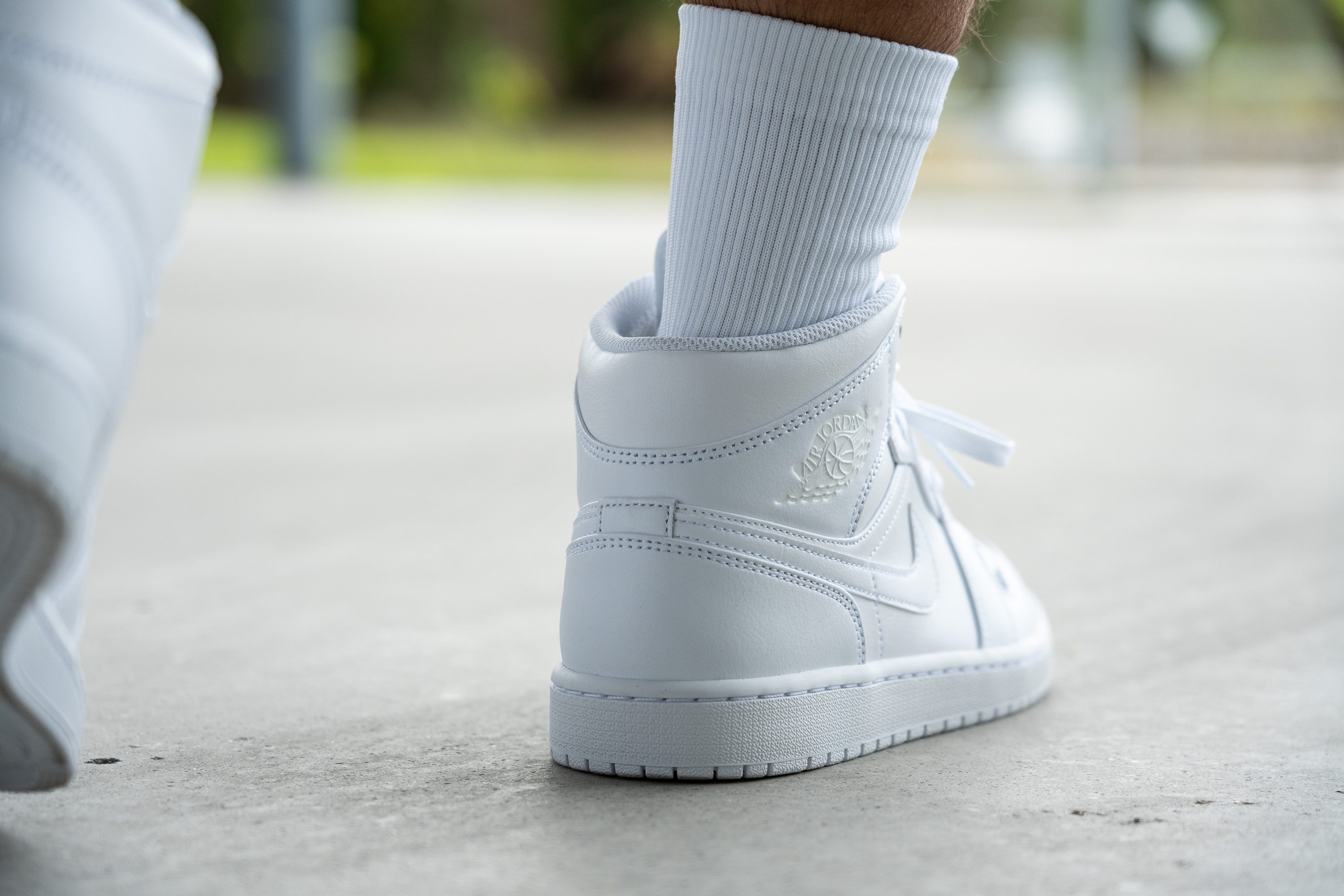
Surefootness and comfiness is a mix we would never sleep on!
| Air 1 Mid | 4 |
| Average | 3.2 |
Midsole width - forefoot
At 113.3 mm, this shoe's midsole width in the forefoot is way wider than average. This means extra stability, and who doesn't love that!
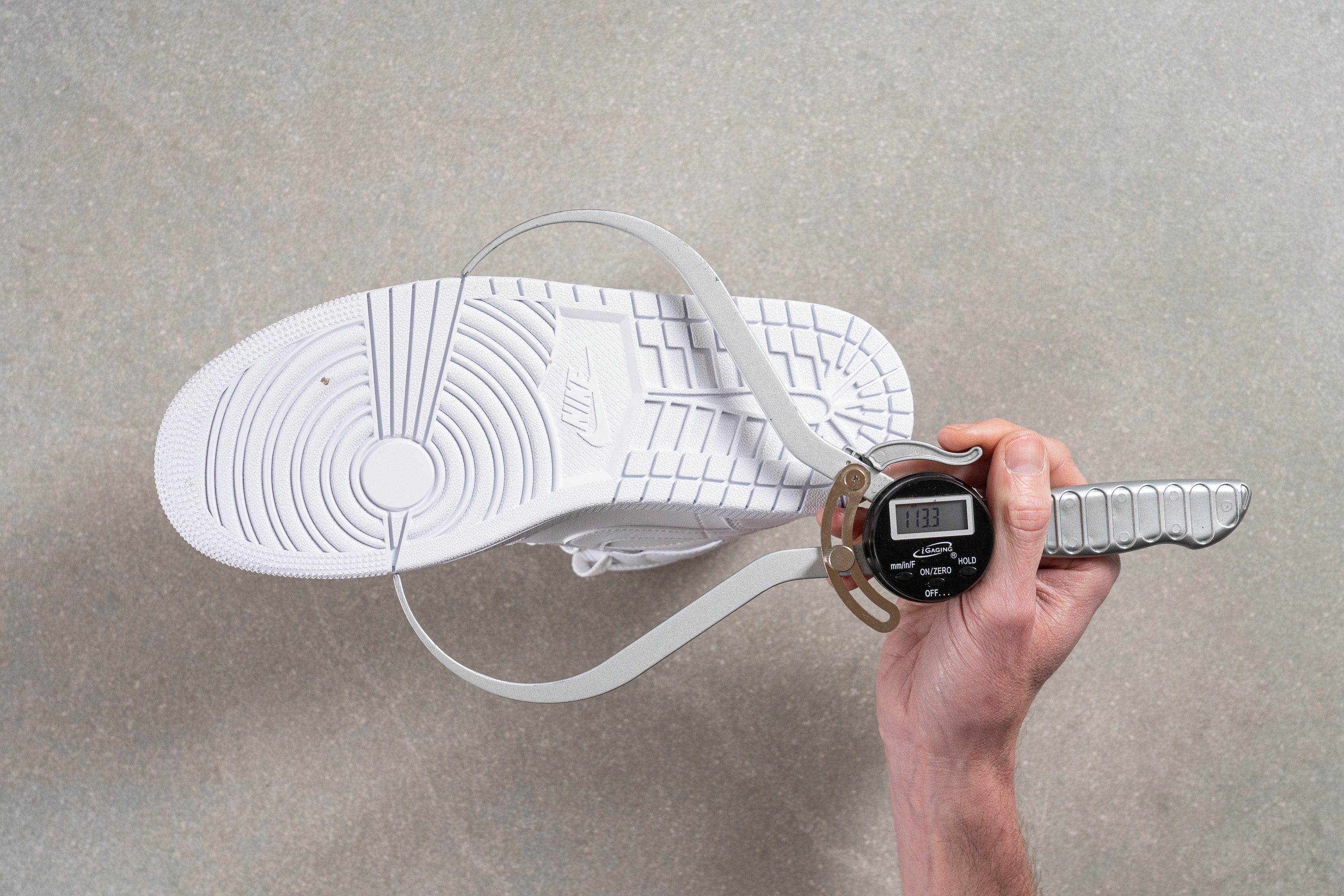
| Air 1 Mid | 113.3 mm |
| Average | 108.9 mm |
Midsole width - heel
Our calliper returned 82.1 mm when we measured the midsole width in the heel. This is pretty close to the average of the shoes we've reviewed in this category, just slightly narrower.
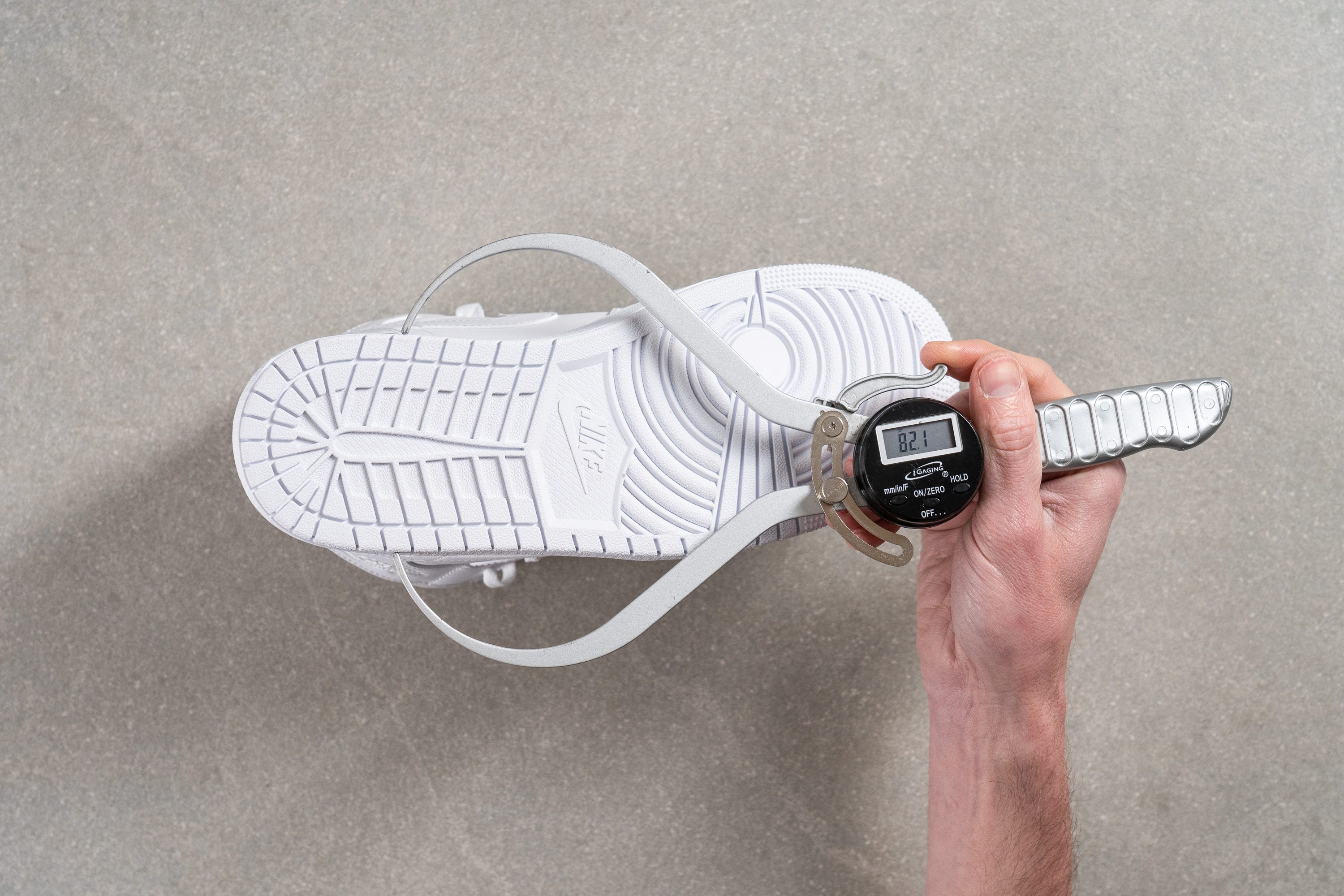
But don't think about it as something negative. A snugger fit in the heel makes sure there's no slippage or unfortunate movements (and that logo... this shoe just couldn't be any cooler if it tried!).
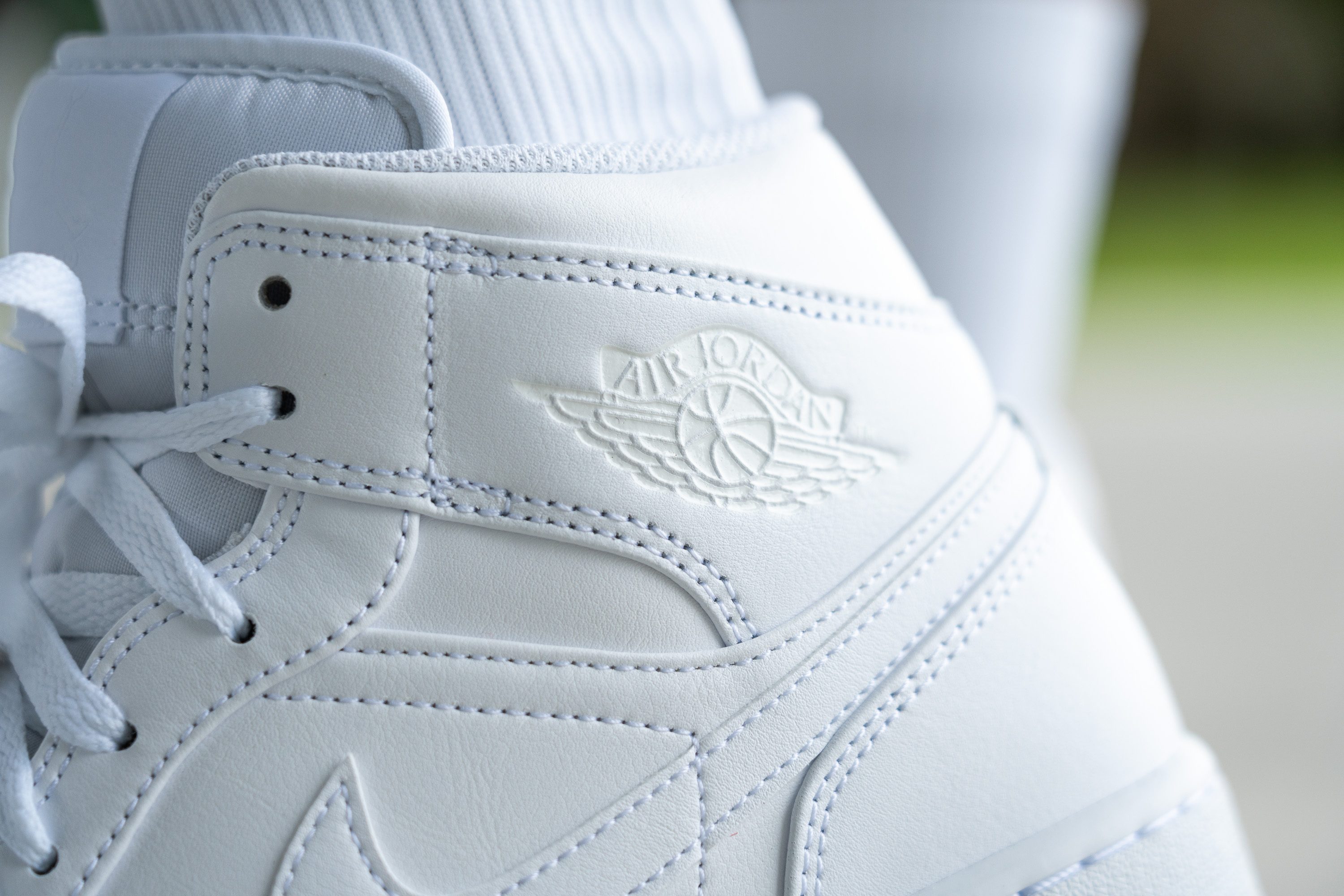
The thing is... the spacious forefoot, which might have welcomed big toes, is now just a happy memory for wide-foot users. Nevertheless, if you've got standard-sized feet and love splaying your toes, then this shoe is ideal!
| Air 1 Mid | 82.1 mm |
| Average | 84.0 mm |
Durability
Leather/Suede quality
Alright, time to light things up! Literally, though.
With our fire test, we check if the materials of the trainers are real or fake/synthetic. Yeah, we know, it's painful to see such a pretty pair of shoes burn, but... we're here to tell you the truth.
As you can see, the leather panels don't catch fire, so worry not: they're authentic/real. But hey, Swoosh, did you think you could get away?
Yep, bonfire verified. The Nike logo is definitely fake/synthetic. Just look at the size of that flame!
| Air 1 Mid | Real leather |
Toebox durability
Whenever a shoe is not very breathable, we expect it to be fairly durable. But our Dremel is the one who has the final say!
The 12-second-long attack at 5K RPM and with 3.2N force is always the same for every shoe, and we also perform it on the very same stop. This helps us keep our results coherent and easily comparable.
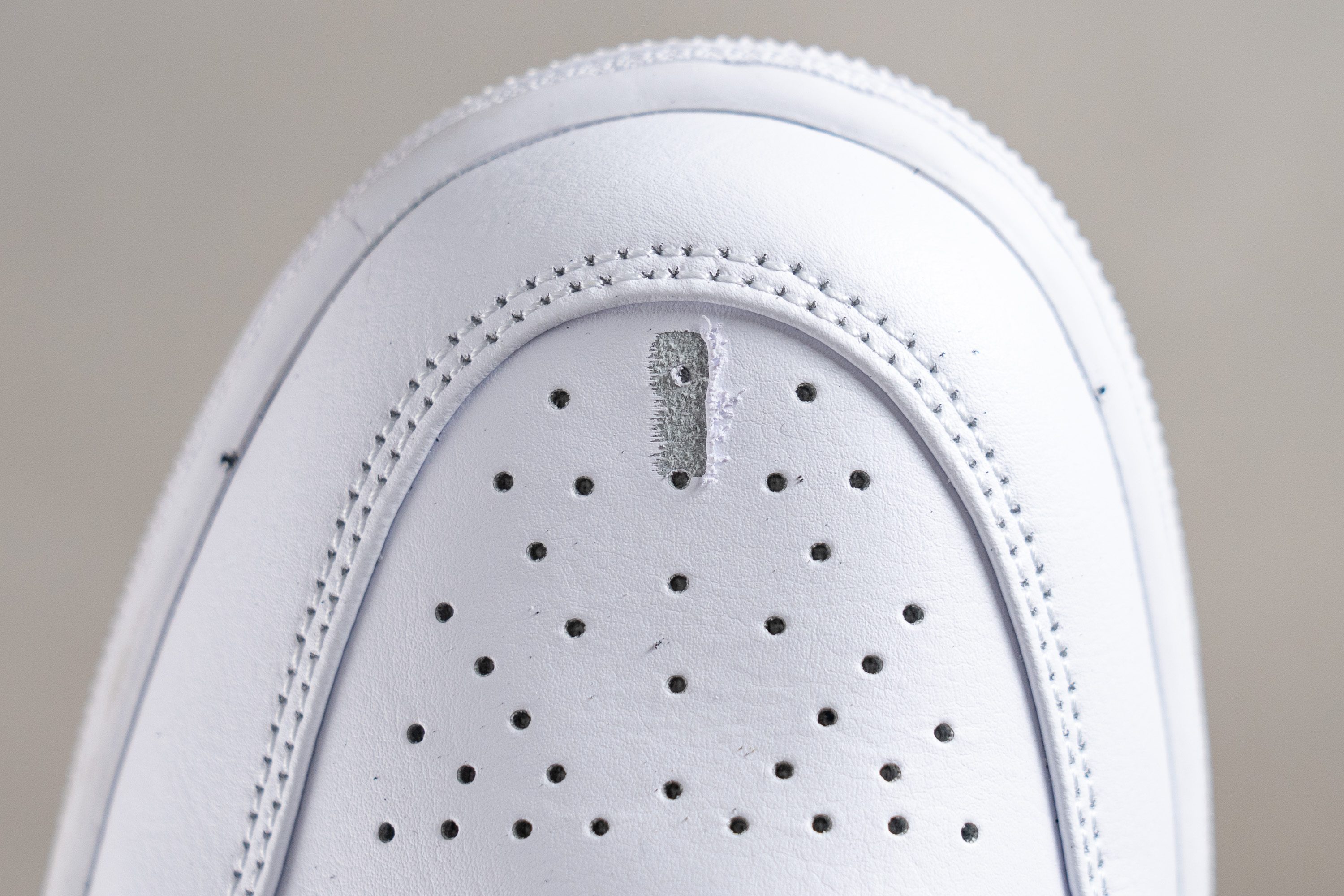
As you can see, in this case the tool could only get rid of the top layer of the material. Yeah, it did leave a quite aesthetically unpleasant scratch, but this did not affect the pair's integrity. Consequently, we decided it to gift this AJ with a 4/5 in our toebox durability test. The perforation didn't even reach the end of one of those supposed holes!
This score is fantastic, and by comparing it with another shoe you'll definitely see why. Look:
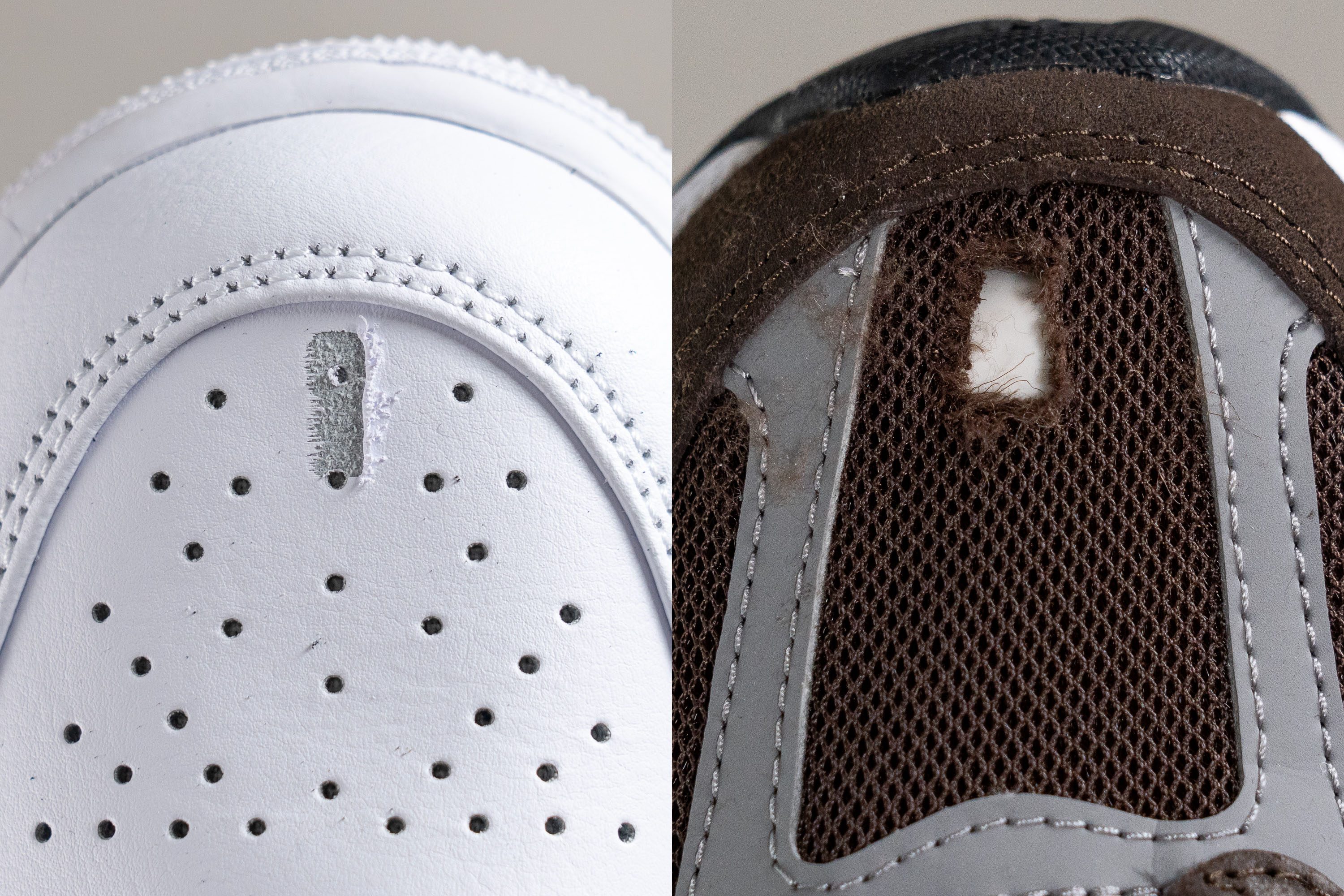
This is the poor New Balance 530, which got obliterated by our Dremel.
It's worth mentioning that, in most cases, leather trainers put durability first and sacrifice some breathability; on the other hand, mesh kicks prioritise breathability and put durability on a second level.
This is exactly what happens here, as the AJ 1 Mid got a 1/5 in breathability but a 4/5 in durability as a leather pair; and yet the NB 530 got a 4/5 in breathability and a 1/5 in durability. Don't forget to check our specifications to see if the shoe you want matches your needs!
| Air 1 Mid | 4 |
| Average | 3.7 |
Heel padding durability
The heel padding is usually the weakest point of a shoe. Like, think about it: you're walking down the street with your fancy new AJ 1; you see some friends, run some errands, go to work... all that time, your Achilles is rubbing the very end of the shoe.
To simulate this constant use and wear, we grab our Dremel and get down to business.
And WOW! You know they say a picture is worth a thousand words, so here it goes:
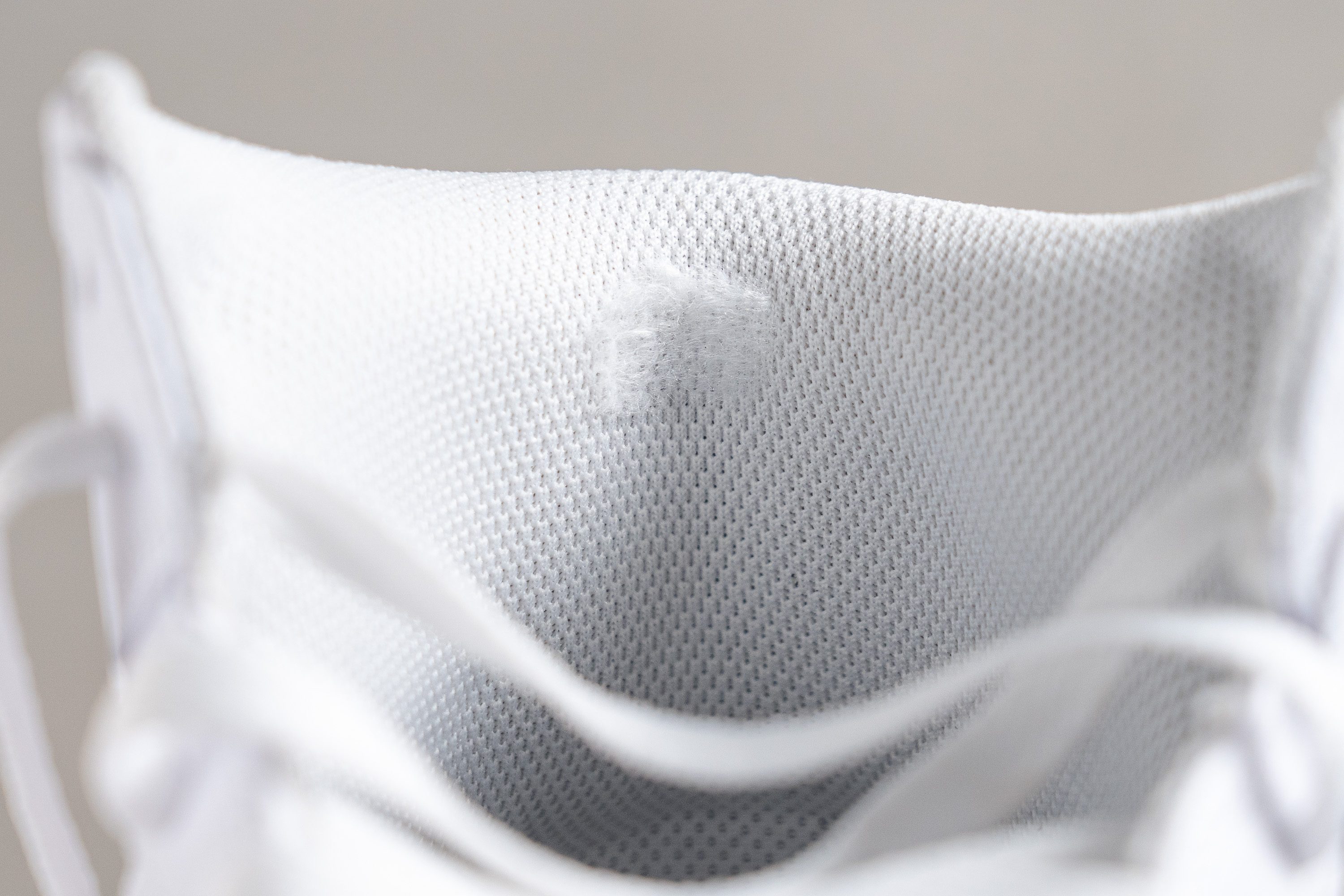
Even though the white material helps you see where we put our Dremel, the results are wonderful! The fabric looks like it had a rough morning, yeah, but trust us, not as rough as the New Balance 237's!
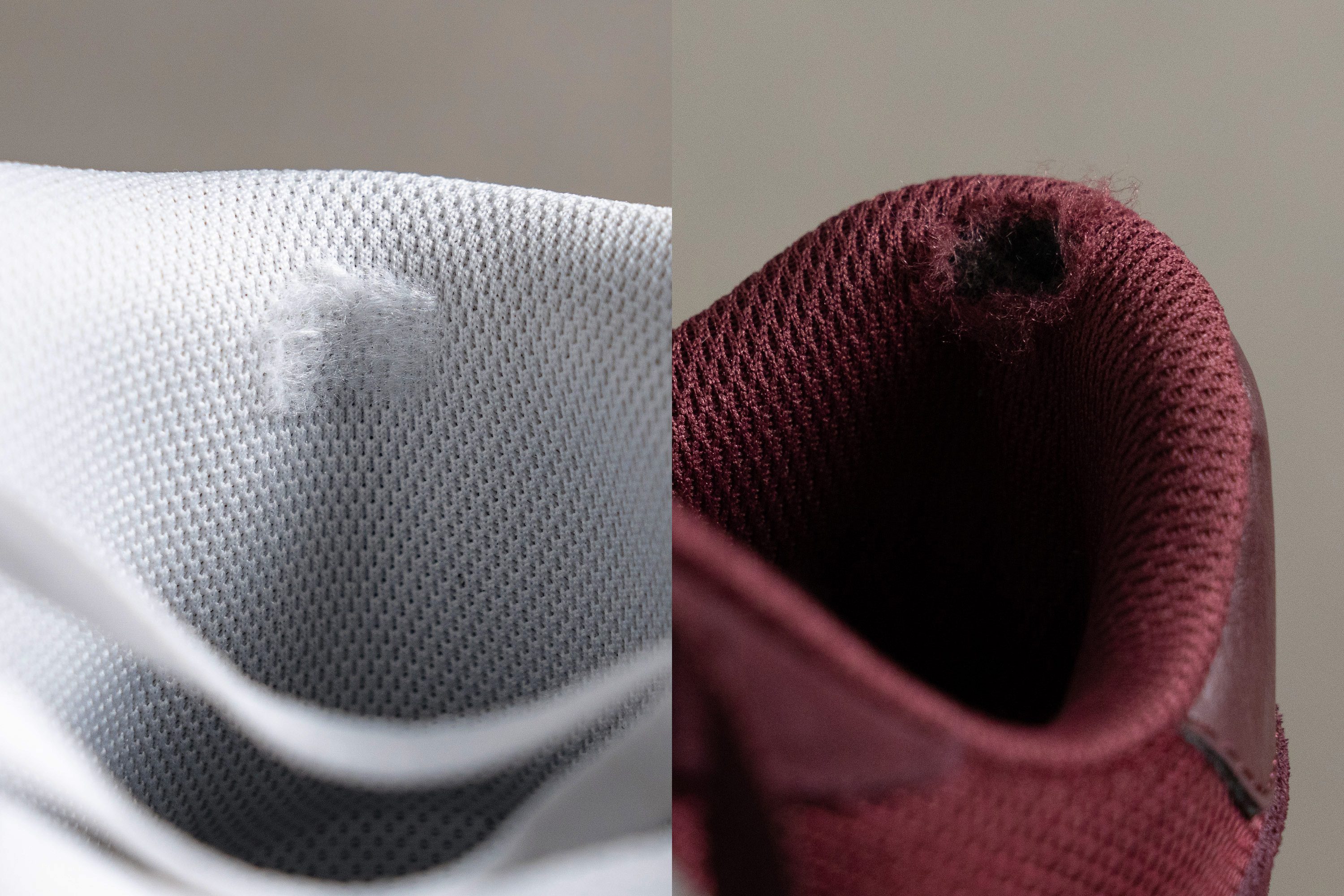
With a formidable 4/5 in heel padding durability, this AJ is definitely made to last. And we LOVE it.
| Air 1 Mid | 4 |
| Average | 3.2 |
Outsole hardness
To measure the hardness of the outsole, we use a tool called durometer. At 85.6 HC, this pair's outsole is pretty much average. Which is great, please don't get us wrong! This result means that the outsole offers a wonderful mix of grip and durability.
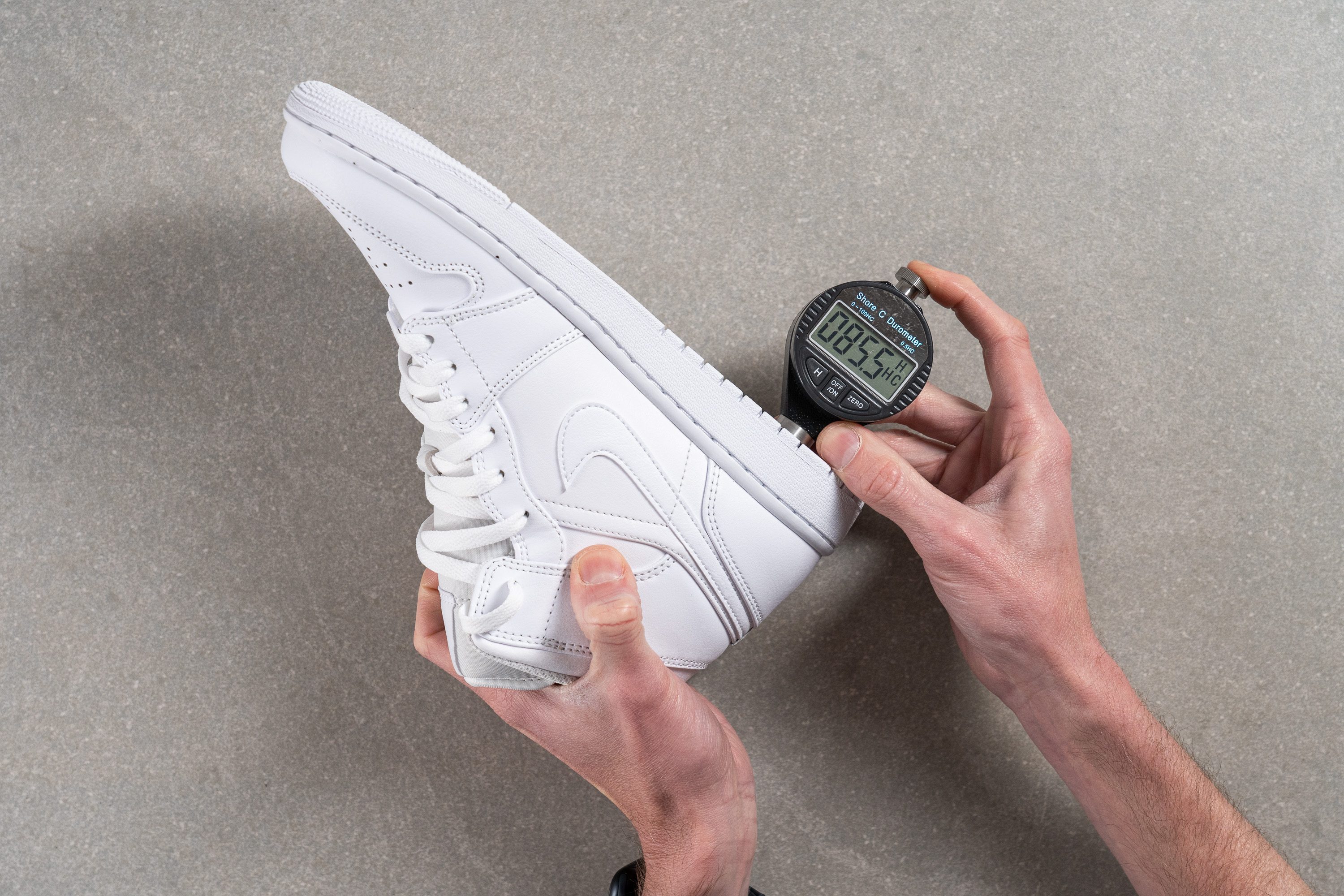
This whole shoe seems to be pretty resistant, right? A toughie with style it is!
| Air 1 Mid | 85.6 HC |
| Average | 85.7 HC |
Outsole durability
Let's make a bet. Do you think this kick is gonna be an all-rounder durability-wise? Our Dremel holds the answer, so let's get into it!
Not bad, not bad. When we saw the final result, we couldn't help but smile, and our tread gauge would do the same if it could!
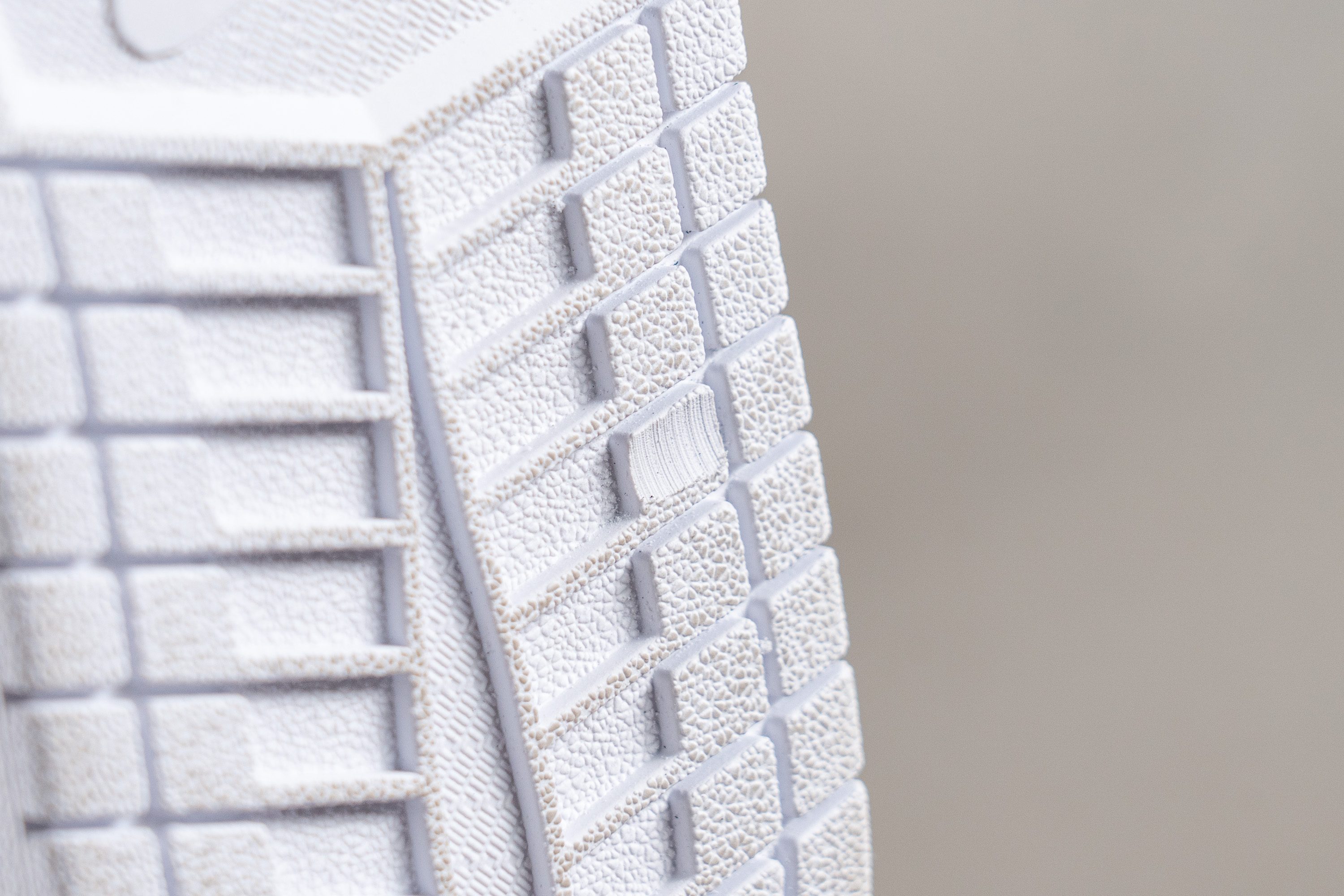
With a dent that's only 0.9 mm deep, this shoe's outsole is more durable than average.
All in all, don't worry about showing it off all day every day!
| Air 1 Mid | 0.9 mm |
| Average | 1.1 mm |
Outsole thickness
To measure the outsole's thickness, we use a calliper. And you might be thinking: Wait, wait, but how do you measure that specific piece? Isn't part of the sole? Yeah, you're totally right!
So, what do we do? Easy. We cut the shoe in half!
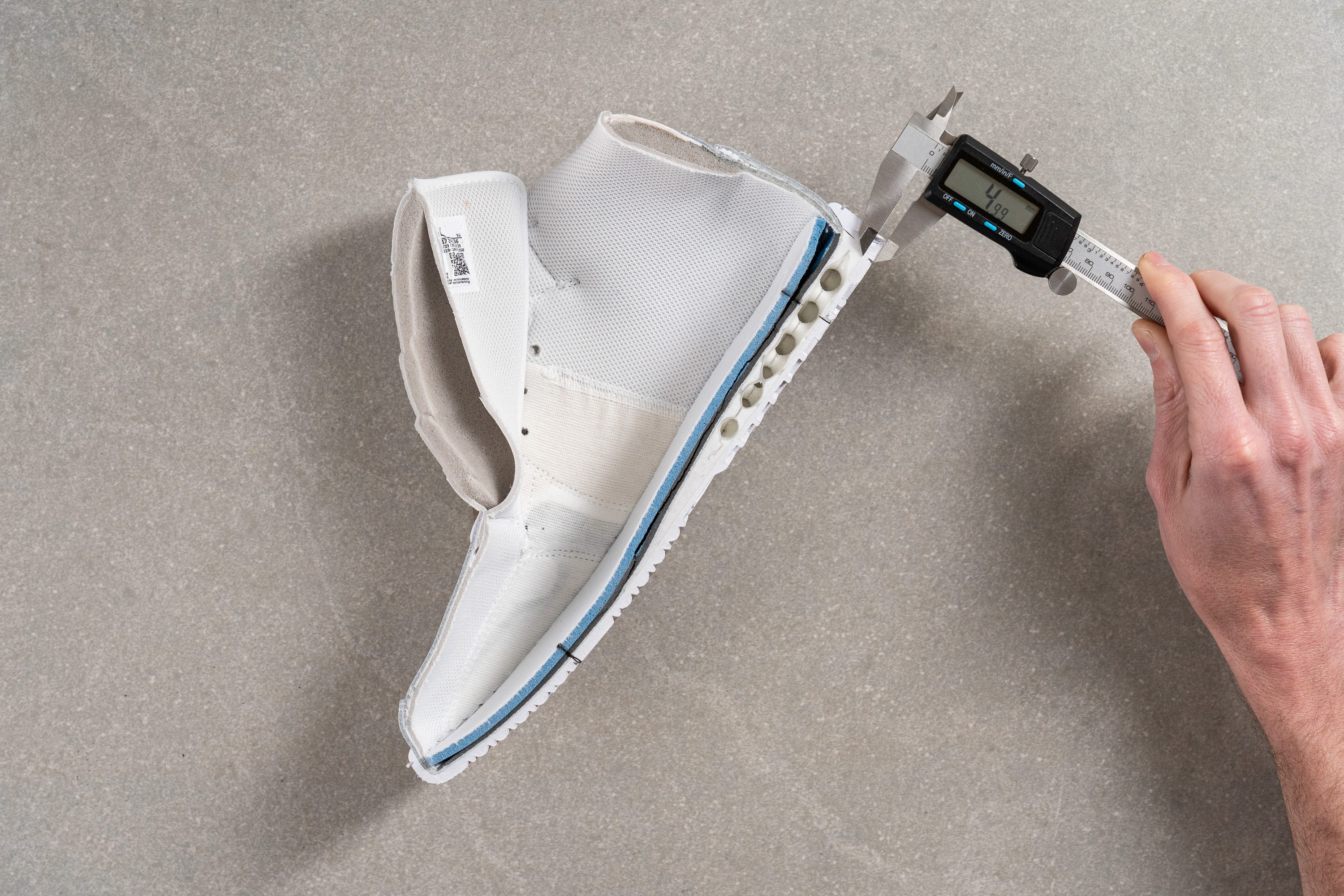
Just like a watermelon on a hot summer evening. This allows us to use our calliper and find out some extra elements that might be hidden. You definitely can't know everything about a shoe just by looking at it!
So, at 5.0 mm, this AJ's outsole is slightly thinner than average. But don't panic, we didn't see this as a problem because of our previous test, where we found out the outsole's material was pretty hard, which also means it's durable. Brands usually go for the thinner outsole + hard outsole material combo when they want to reduce the overall weight of the shoe.
But wait... we spy with our little eye... some Air Cushioning in the rearfoot! This Nike technology makes the ride more comfortable. Our feet would tell you if they could! Just don't think about an "I'm walking on clouds" level of comfort, though, or you might end up being disappointed.
If that's what you're looking for, then you should definitely check the Nike Zoom Vomero 5. It's got a couple of Air Units and a soft midsole that'll make your ride deliciously comfy!
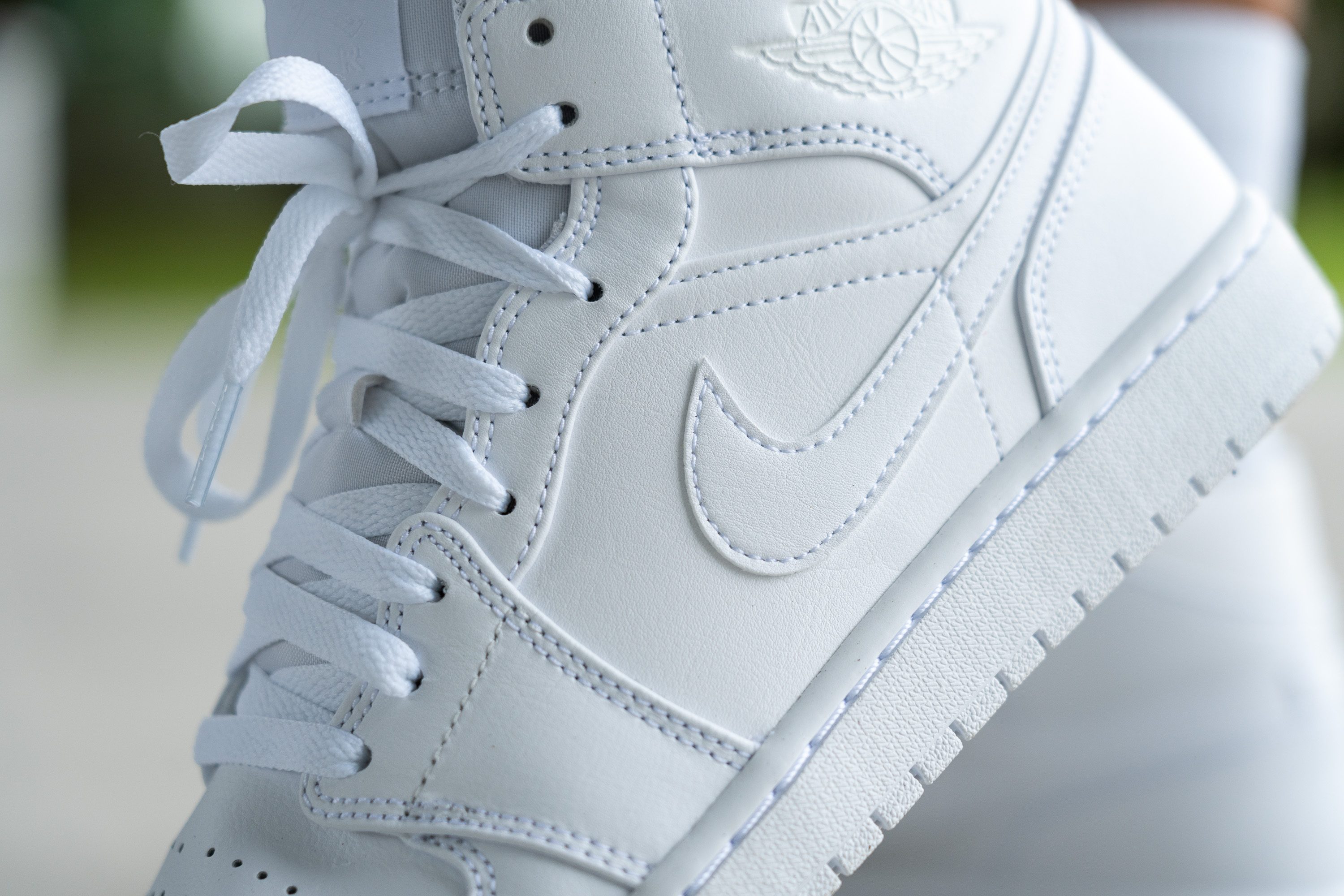
There would be no way to spot this technology from the outside. That's why in RunRepeat we break every shoe in pieces, there's no detail that can run away from us!
| Air 1 Mid | 5.0 mm |
| Average | 5.3 mm |
Misc
Insole thickness
Following its "close to the ground" motto, this shoe's insole is thinner than average.
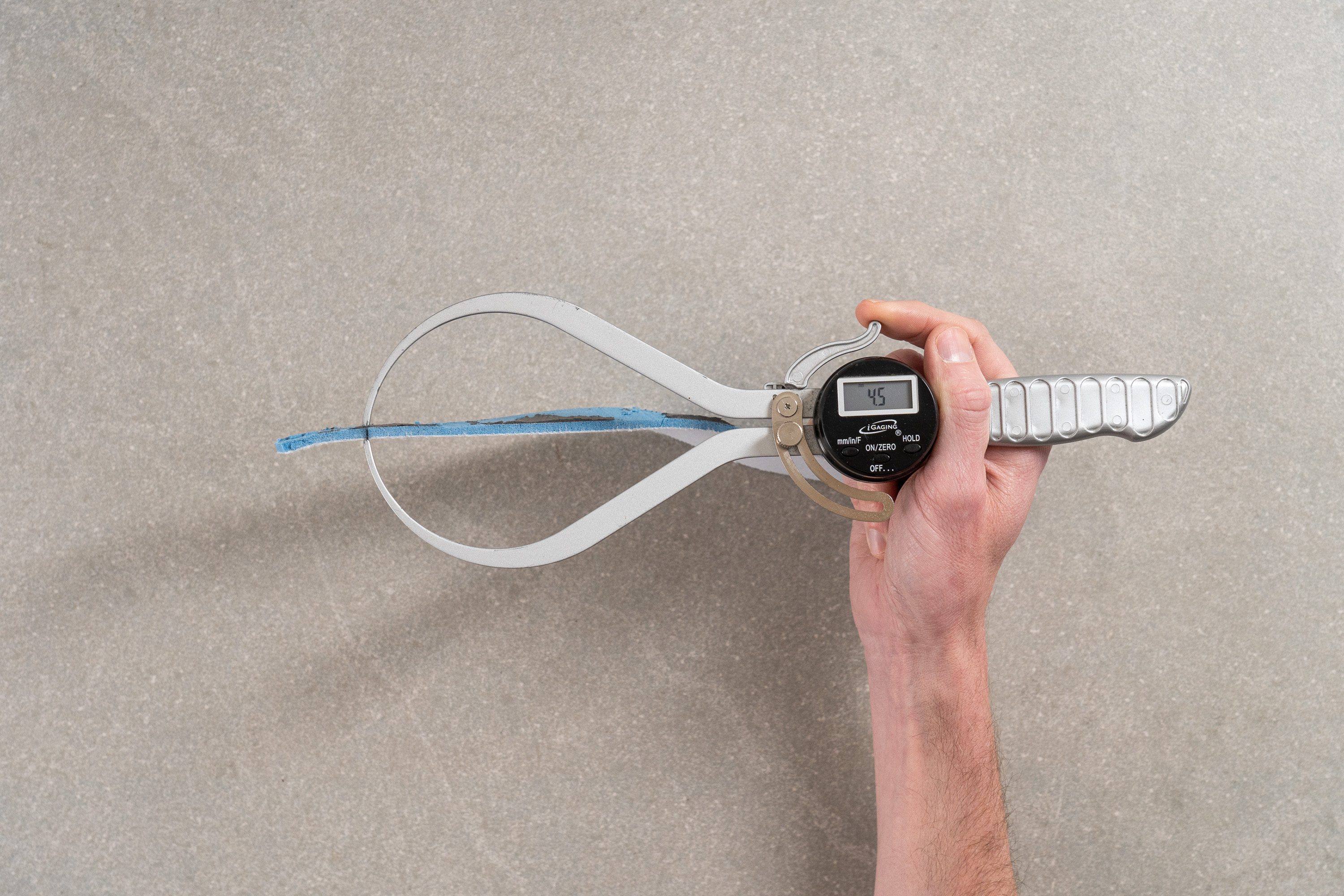
At 4.5 mm, this AJ keeps things simple. Even though this might sound like an inconvenience, it does not affect the shoe's comfort levels at all.
| Air 1 Mid | 4.5 mm |
| Average | 5.1 mm |
Removable insole
We love removable insoles, and the AJ 1 Mid was made to be loved, so... 1+1!
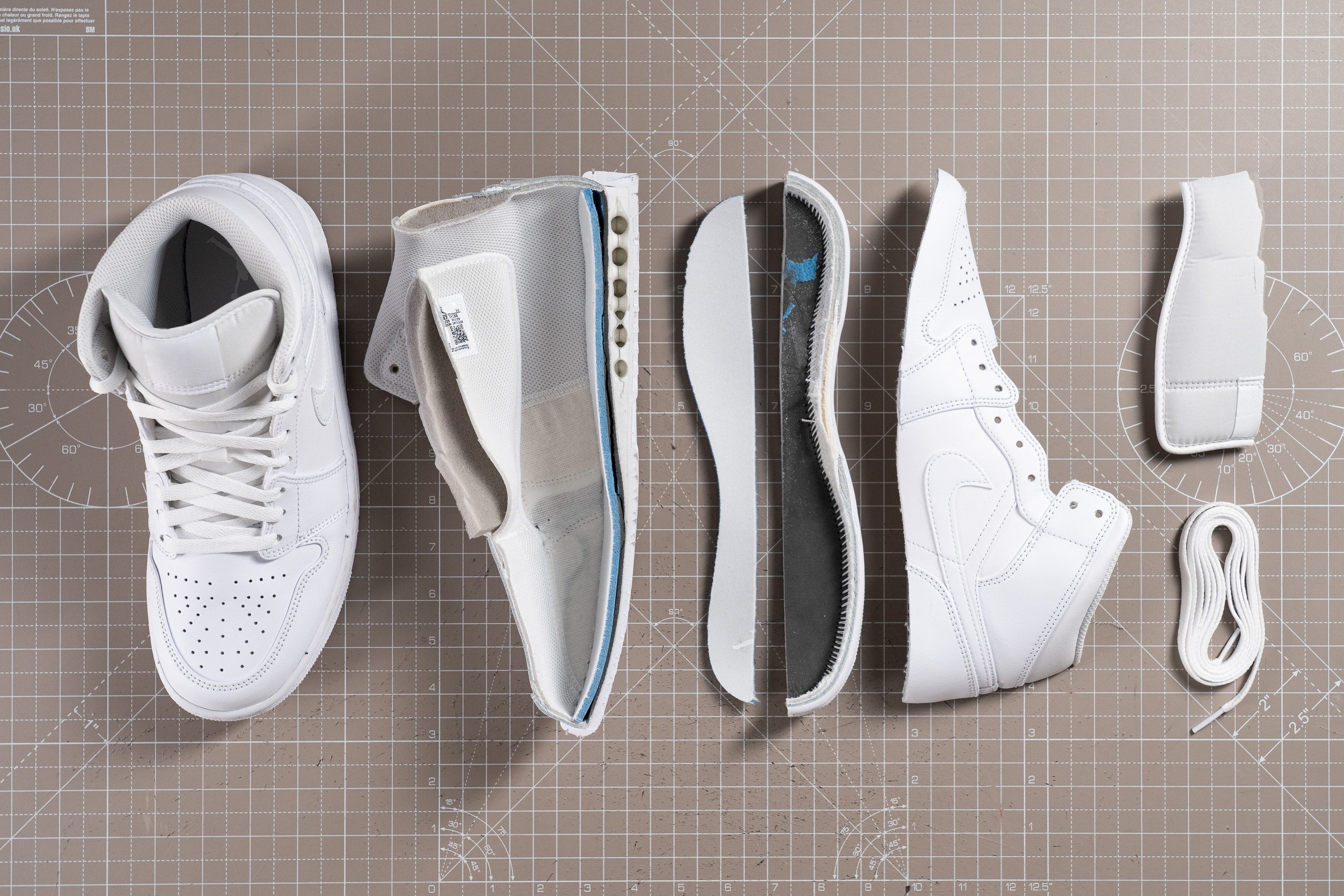
This means you can use your own orthotics if you have to. But honestly, we were quite happy with how comfortable this pair is, so we personally wouldn't want to change its insole unless it was strictly necessary (foot conditions, for example).
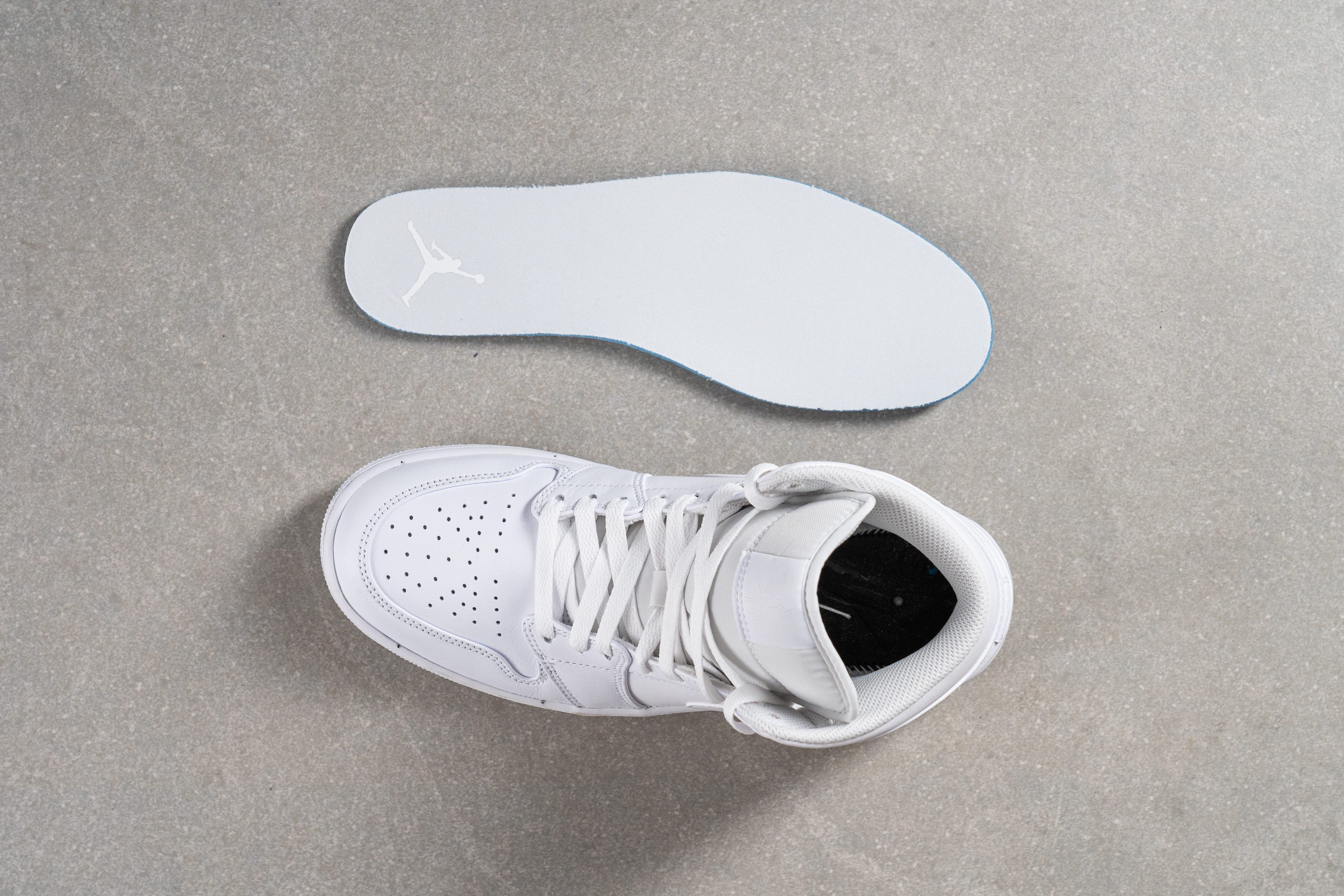
| Air 1 Mid | Yes |
Reflective elements
We know the Air Jordan 1 Mid is brilliant, but the spotlight is yours!
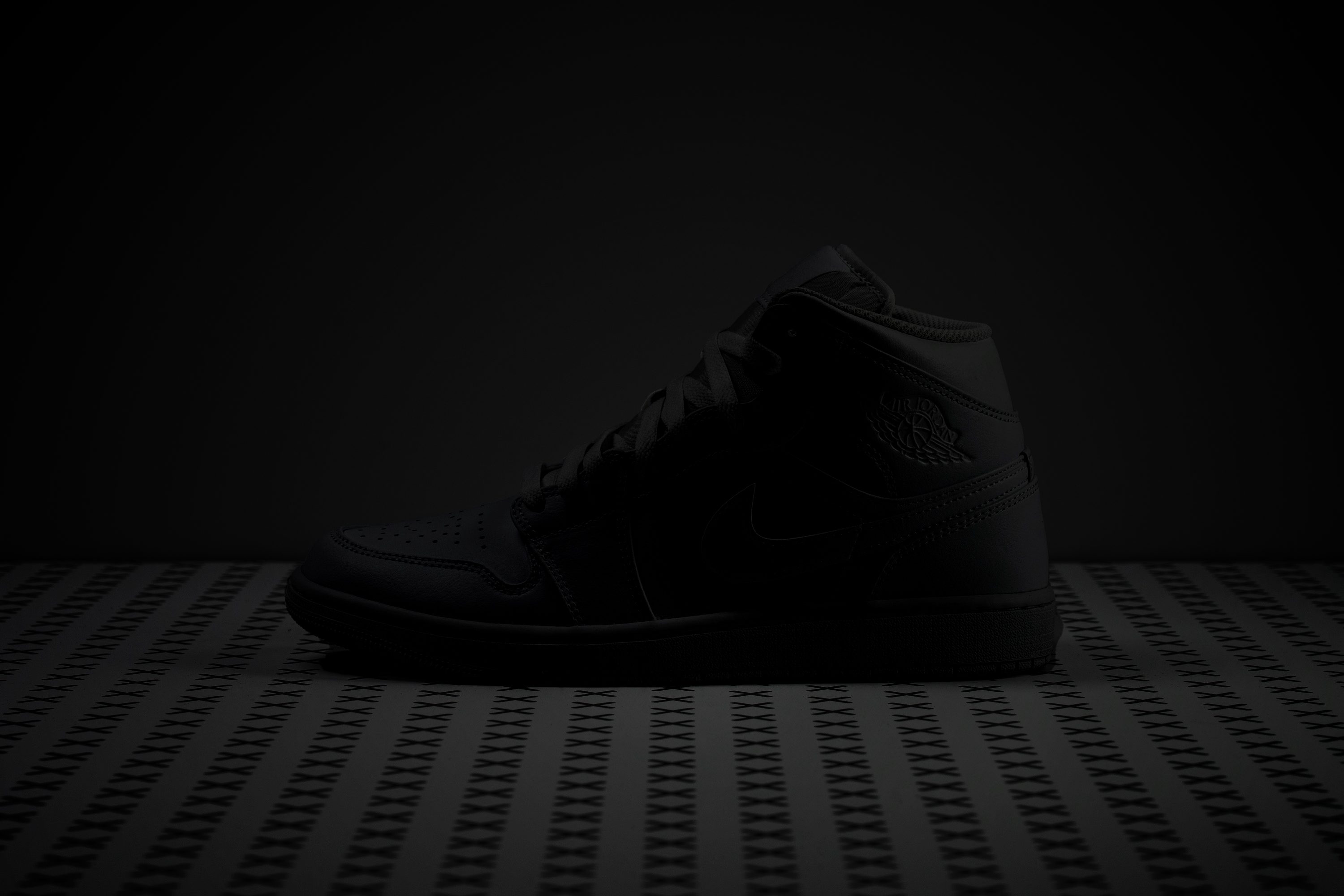
As you can see, the number of reflective elements in this pair is: 0.
| Air 1 Mid | No |
Tongue padding
You don't know padding if you haven't seen the AJ 1 Mid's tongue! (yes, yes, Adidas Campus 00S, we know your tongue would also work as a pillow).
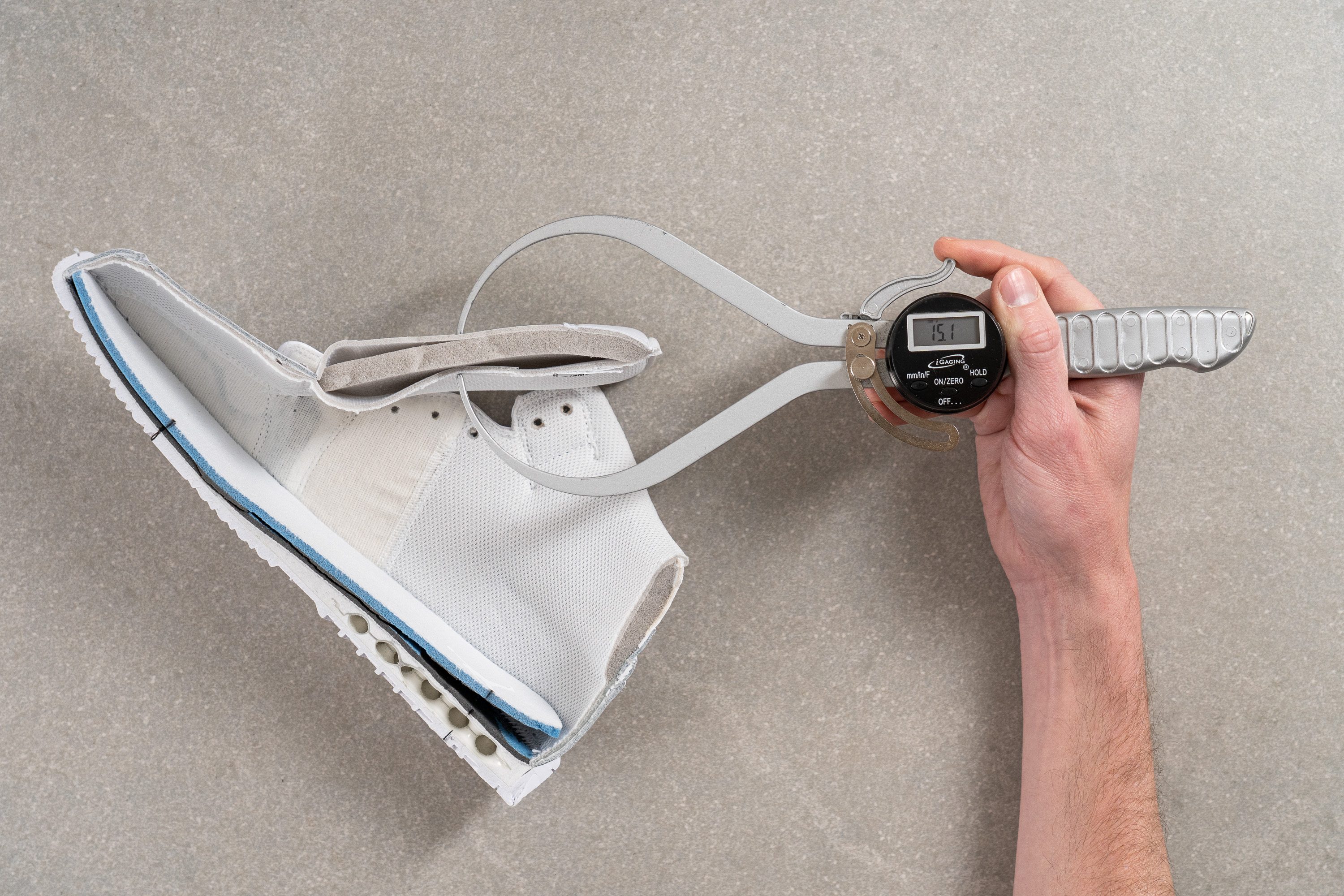
At 15.1 mm, you can absolutely forget about lace bite or any kind of hotspot around the tongue. This just makes the whole shoe even more comfortable, and we love it!
| Air 1 Mid | 15.1 mm |
| Average | 9.6 mm |
Tongue: gusset type
Even though this shoe's tongue is non-gusseted, the central lace loop doesn't let the tongue dance around, don't worry!
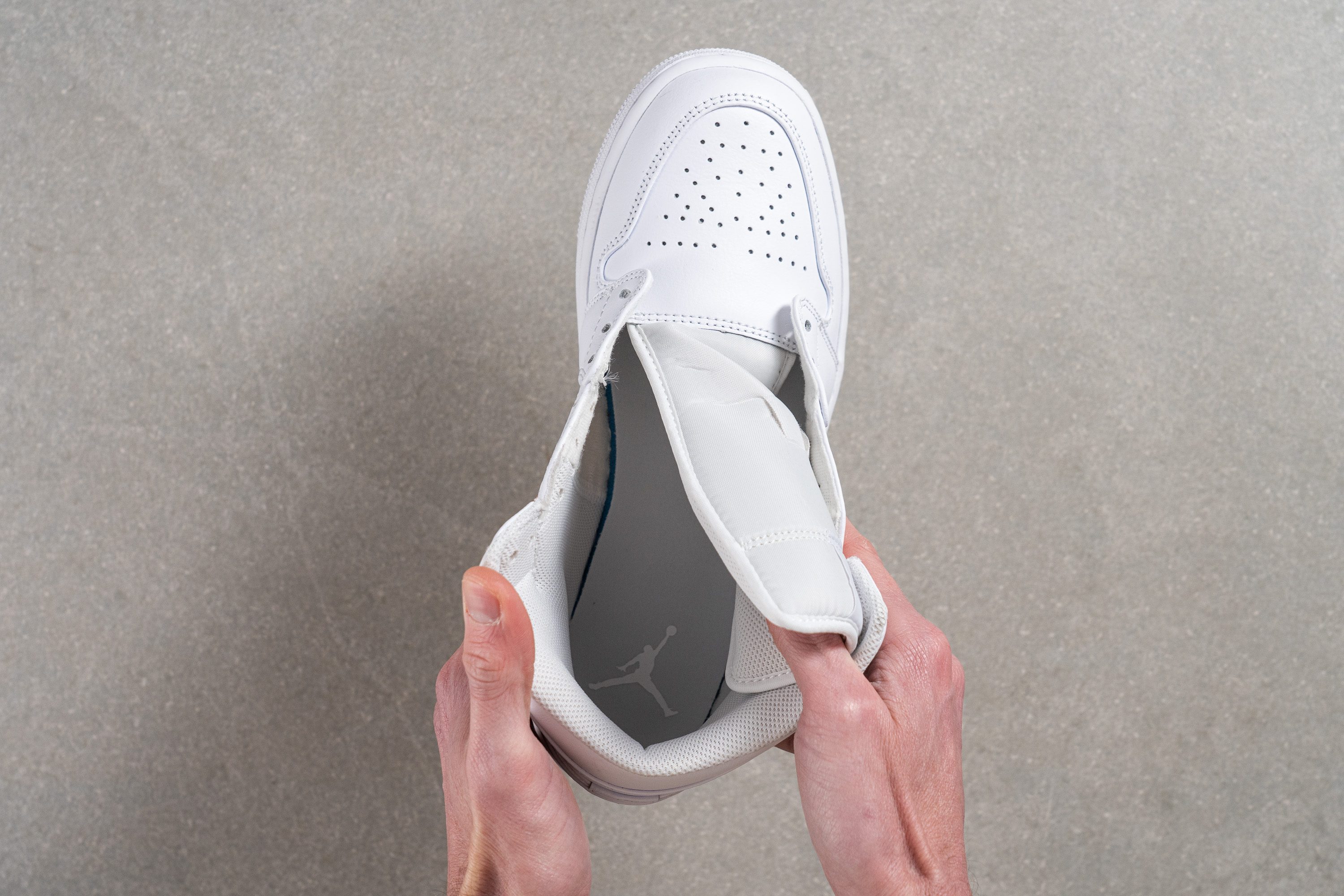
| Air 1 Mid | None |
Heel tab
This model doesn't have a heel tab, but it's not like we actually missed it or anything.
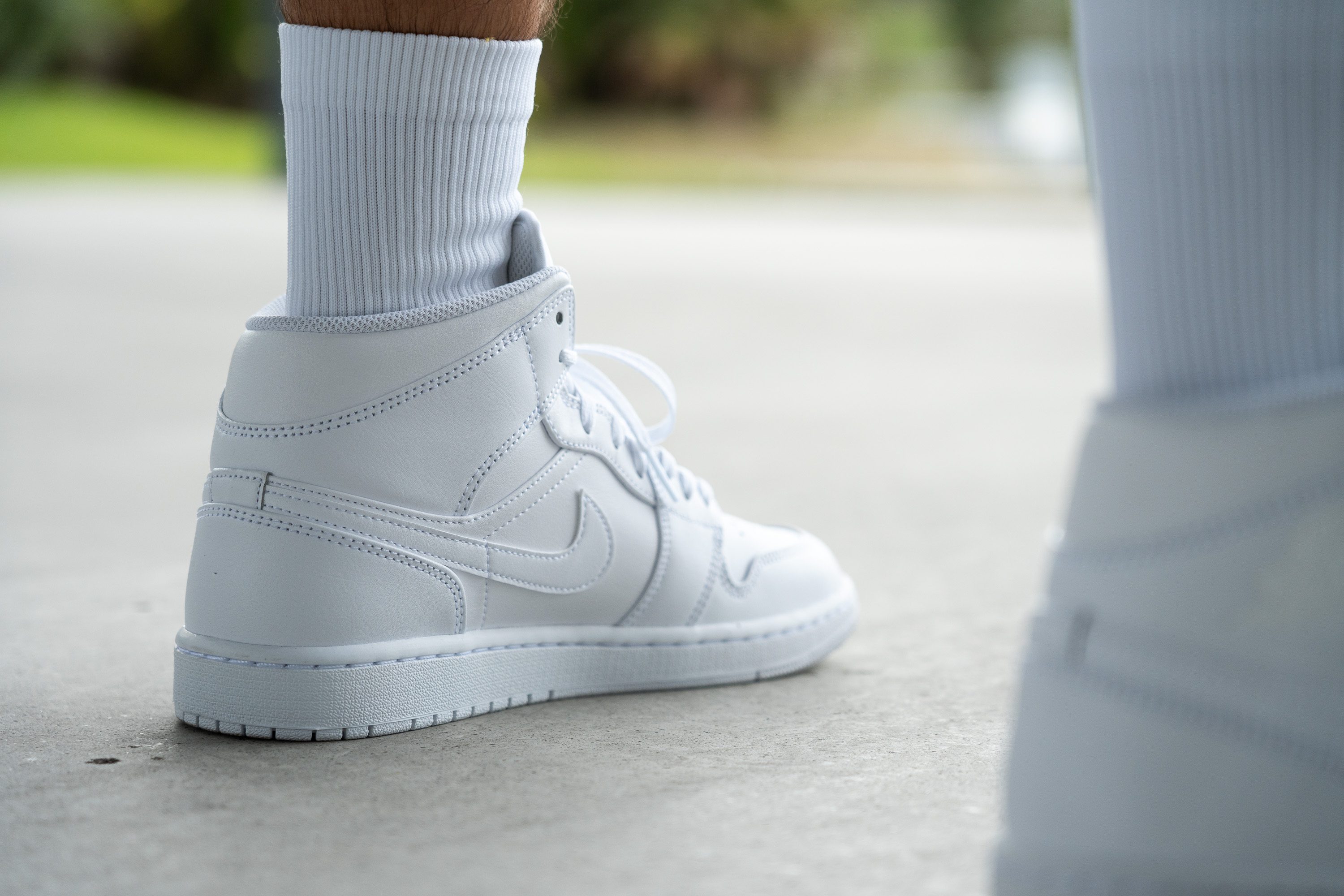
The non-gusseted tongue helps your feet get into the mid-top structure of these kicks. You can just use the back of the shoe if you need to pull, but in our experience, getting it on and off was easy (unless you tie its laces all the way up to the top, then it might take you some more time!).
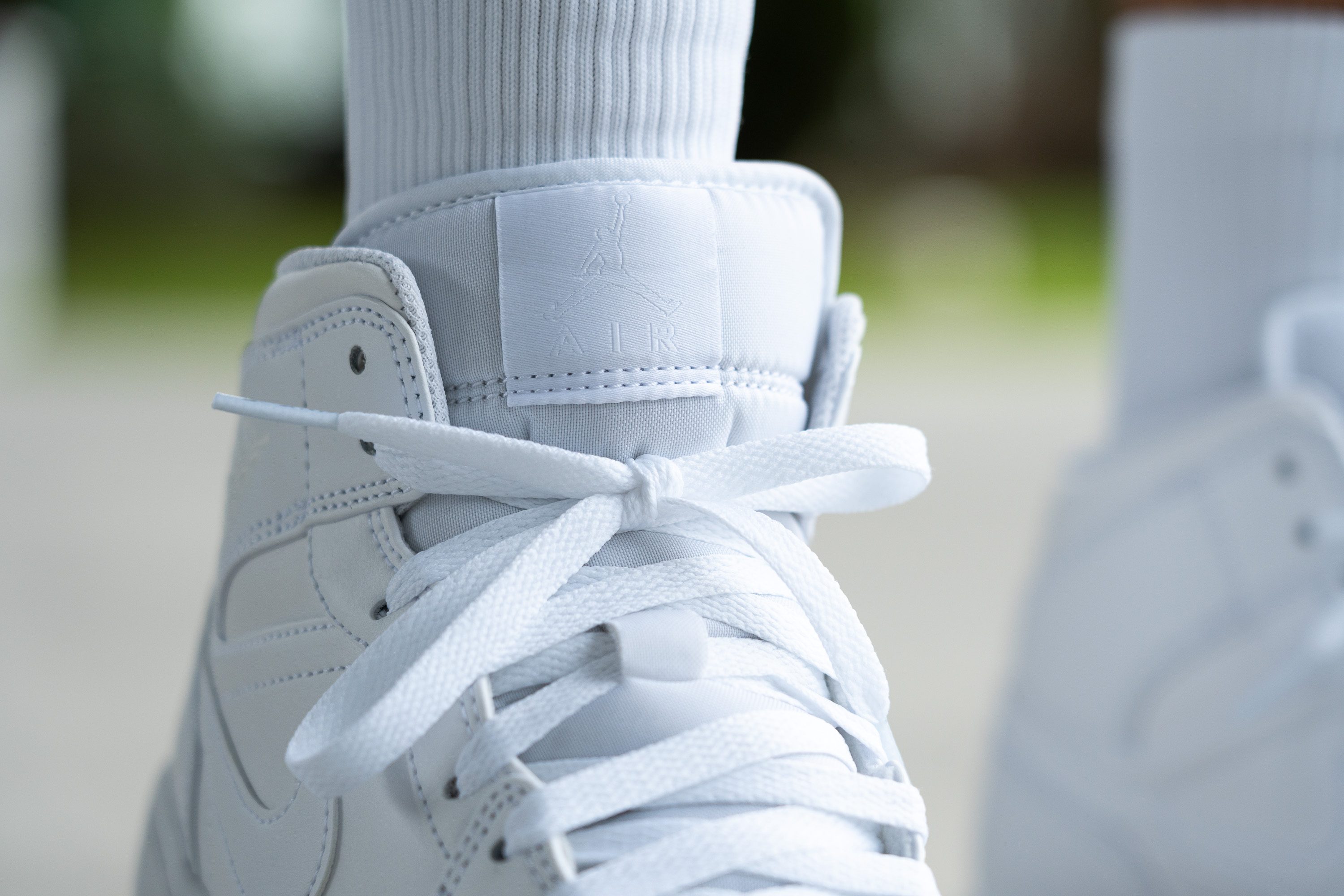
| Air 1 Mid | None |

